Psychological interventions to foster resilience in healthcare students
- PMID: 32691879
- PMCID: PMC7388680
- DOI: 10.1002/14651858.CD013684
Psychological interventions to foster resilience in healthcare students
Abstract
Background: Resilience can be defined as maintaining or regaining mental health during or after significant adversities such as a potentially traumatising event, challenging life circumstances, a critical life transition or physical illness. Healthcare students, such as medical, nursing, psychology and social work students, are exposed to various study- and work-related stressors, the latter particularly during later phases of health professional education. They are at increased risk of developing symptoms of burnout or mental disorders. This population may benefit from resilience-promoting training programmes.
Objectives: To assess the effects of interventions to foster resilience in healthcare students, that is, students in training for health professions delivering direct medical care (e.g. medical, nursing, midwifery or paramedic students), and those in training for allied health professions, as distinct from medical care (e.g. psychology, physical therapy or social work students).
Search methods: We searched CENTRAL, MEDLINE, Embase, 11 other databases and three trial registries from 1990 to June 2019. We checked reference lists and contacted researchers in the field. We updated this search in four key databases in June 2020, but we have not yet incorporated these results.
Selection criteria: Randomised controlled trials (RCTs) comparing any form of psychological intervention to foster resilience, hardiness or post-traumatic growth versus no intervention, waiting list, usual care, and active or attention control, in adults (18 years and older), who are healthcare students. Primary outcomes were resilience, anxiety, depression, stress or stress perception, and well-being or quality of life. Secondary outcomes were resilience factors.
Data collection and analysis: Two review authors independently selected studies, extracted data, assessed risks of bias, and rated the certainty of the evidence using the GRADE approach (at post-test only).
Main results: We included 30 RCTs, of which 24 were set in high-income countries and six in (upper- to lower-) middle-income countries. Twenty-two studies focused solely on healthcare students (1315 participants; number randomised not specified for two studies), including both students in health professions delivering direct medical care and those in allied health professions, such as psychology and physical therapy. Half of the studies were conducted in a university or school setting, including nursing/midwifery students or medical students. Eight studies investigated mixed samples (1365 participants), with healthcare students and participants outside of a health professional study field. Participants mainly included women (63.3% to 67.3% in mixed samples) from young adulthood (mean age range, if reported: 19.5 to 26.83 years; 19.35 to 38.14 years in mixed samples). Seventeen of the studies investigated group interventions of high training intensity (11 studies; > 12 hours/sessions), that were delivered face-to-face (17 studies). Of the included studies, eight compared a resilience training based on mindfulness versus unspecific comparators (e.g. wait-list). The studies were funded by different sources (e.g. universities, foundations), or a combination of various sources (four studies). Seven studies did not specify a potential funder, and three studies received no funding support. Risk of bias was high or unclear, with main flaws in performance, detection, attrition and reporting bias domains. At post-intervention, very-low certainty evidence indicated that, compared to controls, healthcare students receiving resilience training may report higher levels of resilience (standardised mean difference (SMD) 0.43, 95% confidence interval (CI) 0.07 to 0.78; 9 studies, 561 participants), lower levels of anxiety (SMD -0.45, 95% CI -0.84 to -0.06; 7 studies, 362 participants), and lower levels of stress or stress perception (SMD -0.28, 95% CI -0.48 to -0.09; 7 studies, 420 participants). Effect sizes varied between small and moderate. There was little or no evidence of any effect of resilience training on depression (SMD -0.20, 95% CI -0.52 to 0.11; 6 studies, 332 participants; very-low certainty evidence) or well-being or quality of life (SMD 0.15, 95% CI -0.14 to 0.43; 4 studies, 251 participants; very-low certainty evidence). Adverse effects were measured in four studies, but data were only reported for three of them. None of the three studies reported any adverse events occurring during the study (very-low certainty of evidence).
Authors' conclusions: For healthcare students, there is very-low certainty evidence for the effect of resilience training on resilience, anxiety, and stress or stress perception at post-intervention. The heterogeneous interventions, the paucity of short-, medium- or long-term data, and the geographical distribution restricted to high-income countries limit the generalisability of results. Conclusions should therefore be drawn cautiously. Since the findings suggest positive effects of resilience training for healthcare students with very-low certainty evidence, high-quality replications and improved study designs (e.g. a consensus on the definition of resilience, the assessment of individual stressor exposure, more attention controls, and longer follow-up periods) are clearly needed.
Trial registration: ClinicalTrials.gov NCT00892138 NCT02867657 NCT03669016 NCT03903978 NCT04064372 NCT04416074.
Copyright © 2020 The Cochrane Collaboration. Published by John Wiley & Sons, Ltd.
Conflict of interest statement
Angela Kunzler: none known. Isabella Helmreich is a board‐certified cognitive‐behaviour therapist. Jochem König: none known. Andrea Chmitorz is a board‐certified cognitive‐behaviour therapist. Michèle Wessa is a board‐certified cognitive‐behaviour therapist. Harald Binder: none known. Klaus Lieb (KL) is a board‐certified cognitive‐behaviour therapist with a special interest in schema therapy, and an Editor with Cochrane Developmental, Psychosocial and Learning Problems. KL received funding for this review from the Ministry of Science (MWWK) of the State Rhineland‐Palatinate, Germany.
Figures
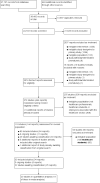



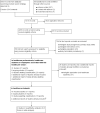






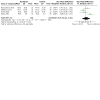


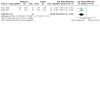
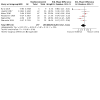



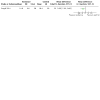
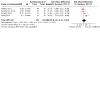

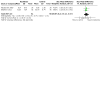

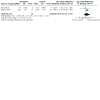


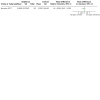
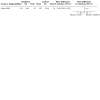

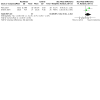


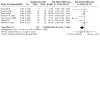

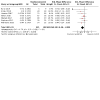

References
References to studies included in this review
Akbari 2017 {published data only}
-
- Akbari B. Effectiveness of training psychological resilience on aggression and happiness among students. Journal of Holistic Nursing and Midwifery 2017;27(1):1-7. [DOI: 10.18869/acadpub.hnmj.27.1.1] - DOI
Anderson 2017 {published data only}
-
- Anderson GS, Vaughan AD, Mills S. Building personal resilience in paramedic students. Journal of Community Safety & Well-being 2017;2(2):51-4. [DOI: 10.35502/jcswb.44] - DOI
Barry 2019 {published and unpublished data}
Chen 2018a {published data only}
-
- Chen L, Kelleher C. Comparative impact of brief mindfulness-based compassion and mindfulness-based stress reduction programs on stress management and grades of first semester nursing students. Global Advances In Health and Medicine 2018;7:174. [DOI: 10.1177/2164956118773837] [3562] - DOI
Delaney 2016 {published data only}
Erogul 2014 {published and unpublished data}
Galante 2018 {published data only}
-
- Galante J, Dufour G, Vainre M, Wagner AP, Stochl J, Benton A, et al. A mindfulness-based intervention to increase resilience to stress in university students (the Mindful Student Study): a pragmatic randomised controlled trial. Lancet. Public Health 2018;3(2):e72-81. [DOI: 10.1016/S2468-2667(17)30231-1] [PMC5813792] [PMID: ] - DOI - PMC - PubMed
-
- Galante J, Dufour G, Vainre M, Wagner AP, Stochl J, Benton A, et al. Effectiveness of providing university students with a mindfulness-based intervention to increase resilience to stress: a pragmatic randomised controlled trial. Early Intervention in Psychiatry 2018;12(Suppl 1):96. [DOI: 10.1111/eip.12723] [Oral 16, Talk 5] - DOI
Geschwind 2015 {published data only}
Goldstein 2019 {published and unpublished data}
-
- Goldstein MR. Improvements in sleep disturbance following yogic breathing-based stress-management intervention compared to cognitively based intervention in college students. Sleep 2019;42(Suppl 1):A394-5. [DOI: 10.1093/sleep/zsz067.977] [0980] - DOI
Houston 2017 {published and unpublished data}
-
- First J, First NL, Houston B. Resilience and Coping Intervention (RCI): a group intervention to foster college student resilience. Social Work with Groups 2018;41(3):198-210. [DOI: 10.1080/01609513.2016.1272032] - DOI
-
- Houston JB, First J, Spialek ML, Sorenson ME, Mills-Sandoval T, Lockett M, et al. Randomized controlled trial of the resilience and coping intervention (RCI) with undergraduate university students. Journal of American College Health 2017;65(1):1-9. [DOI: 10.1080/07448481.2016.1227826] [PMID: ] - DOI - PubMed
ISRCTN64217625 {published data only}
-
- ISRCTN64217625. An evaluation of resilience interventions for emergency workers [An evaluation of resilience interventions for emergency workers: a randomised controlled trial]. www.isrctn.com/ISRCTN64217625 (first received 5 February 2016).
Kelleher 2018 {published data only}
-
- Kelleher C, Chen L. Impact of a brief mindfulness-based stress reduction program for first semester nursing students. Global Advances In Health and Medicine 2018;7:172. [DOI: 10.1177/2164956118773837] [3555] - DOI
Kötter 2016 {published data only}
Mathad 2017 {published data only}
Mejia‐Downs 2016 {unpublished data only}
-
- Mejia-Downs AM. An Intervention Enhances Resilience in Physical Therapy Students [PhD thesis]. Provo (UT): Rocky Mountain University of Health Professions, 2016.
Miu 2016 {published data only}
-
- Miu AS. The Effects of Mindsets on Depression [PhD thesis]. Atlanta (GA): Emory University, 2016.
Mueller 2018 {published data only}
-
- Mueller K, Prins R, De Heer HD. An online intervention increases empathy, resilience, and work engagement among physical therapy students. Journal of Allied Health 2018;47(3):196-203. [PMID: ] - PubMed
Peng 2014 {published data only}
-
- Peng L, Li M, Jiang X, Zuo X, Miao Y, Yu Y, et al. Effects of resilience training on positive and negative emotion and emotion regulation strategies in military medical students with different resilience. Journal of Third Military Medical University 2014;36(5):470-2. [en.cnki.com.cn/Article_en/CJFDTOTAL-DSDX201405015.htm]
-
- Peng L, Li M, Zuo X, Miao Y, Chen L, Yu Y, et al. Application of the Pennsylvania resilience training program on medical students. Personality and Individual Differences 2014;61-2:47-51. [DOI: 10.1016/j.paid.2014.01.006] - DOI
Porter 2008 {published and unpublished data}
-
- Porter S, Johnson A. Increasing paramedic students' resiliency to stress: assessing correlates and the impact of intervention. College Quarterly 2008;11(3):1-13. [files.eric.ed.gov/fulltext/EJ830648.pdf]
Recabarren 2019 {published and unpublished data}
-
- NCT03861013. Reward under stress: effects of a multidimensional stress prevention program in university students [Reward under stress: psychobiological mechanisms of resilience to stress]. clinicaltrials.gov/ct2/show/NCT03861013 (first received 23 December 2018).
-
- Recabarren RE, Gaillard C, Guillod M, Martin-Soelch C. Short-term effects of a multidimensional stress prevention program on quality of life, well-being and psychological resources. A randomized controlled trial. Frontiers in Psychiatry 2019;10:88. [DOI: 10.3389/fpsyt.2019.00088] [PMC6422882] [PMID: ] - DOI - PMC - PubMed
Sahranavard 2018 {published data only}
-
- Sahranavard S, Esmaeili A, Salehiniya H, Behdani S. The effectiveness of group training of cognitive behavioral therapy-based stress management on anxiety, hardiness and self-efficacy in female medical students. Journal of Education and Health Promotion 2019;8:49. [DOI: 10.4103/jehp.jehp_327_18] [PMC6432834] [PMID: ] - DOI - PMC - PubMed
Samouei 2015 {published data only}
-
- Samouei R, Ghasemim F. Role of mindfulness training on psychological capital of Isfahan University of Medical Sciences students. International Journal of Educational & Psychological Researches 2015;1(4):293–7. [DOI: 10.4103/2395-2296.163936] - DOI
Smeets 2014 {published data only (unpublished sought but not used)}
Stephens 2012 {unpublished data only}
-
- Stephens TL. Increasing Resilience in Adolescent Nursing Students [PhD thesis]. Knoxville (TN): University of Tennessee, 2012.
Venieris 2017 {published data only}
-
- Venieris P. The Happiness Project: A Randomized Control Trial of an Online Positive Psychology Intervention for Graduate Students [PhD thesis]. Tempe (AZ): Arizona State University, 2017.
Victor 2018 {published and unpublished data}
-
- Victor P, Dikloo AS, Schwert P, Willutzki U. Resilienz- vs problemorientierte beratung von studierenden: eine randomisierte kontrollierte studie. Zeitschrift für Klinische Psychologie und Psychotherapie 2018;47(4):241-51. [DOI: 10.1026/1616-3443/a000496] - DOI
Waddell 2005 {published data only}
-
- Waddell J, Bauer M. Career planning and development for students: building a career in a professional practice discipline. Canadian Journal of Career Development 2005;4(2):4-13. [cjcdonline.ca/wp-content/uploads/2014/11/Career-Planning-and-Development...
Waddell 2015 {published data only (unpublished sought but not used)}
-
- Waddell J, Spalding K, Canizares G, Navarro J, Connell M, Jancar S, et al. Integrating a career planning and development program into the baccalaureate nursing curriculum: part I. Impact on students' career resilience. International Journal of Nursing Education Scholarship 2015;12:162-73. [DOI: 10.1515/ijnes-2014-0035] [PMID: ] - DOI - PubMed
Wang 2012 {published data only}
-
- Wang Z, Wang H-Z, Zhai H-M. Effects of positive-psychology-based group counseling on college students with mental crisis. Journal of Nursing 2012;19(11):4-7. [en.cnki.com.cn/Article_en/CJFDTOTAL-NFHL201211003.htm]
References to studies excluded from this review
ACTRN12617000300370 {published data only}
-
- ACTRN12617000300370. The effect of mobile mindfulness meditation on distress in two cohorts: incoming university students and university staff [A randomised, controlled trial to evaluate the effectiveness of a mobile mindfulness meditation tool at reducing distress, and improving wellness, resilience, and mindfulness in two cohorts: incoming university students and university staff]. www.anzctr.org.au/Trial/Registration/TrialReview.aspx?id=372301 (first received 17 February 2017).
Brady 2016 {published data only}
-
- Brady ST, Reeves SL, Garcia J, Purdie-Vaughns V, Cook JE, Taborsky-Barba S, et al. The psychology of the affirmed learner: spontaneous self-affirmation in the face of stress. Journal of Educational Psychology 2016;108(3):353-73. [DOI: 10.1037/edu0000091] - DOI
De la Fuente 2018 {published data only}
-
- De la Fuente J, Mañas I, Franco C, Cangas AJ, Soriano E. Differential effect of level of self-regulation and mindfulness training on coping strategies used by university students. International Journal of Environmental Research and Public Health 2018;15(10):E2230. [DOI: 10.3390/ijerph15102230] [PMC6210926] [PMID: ] - DOI - PMC - PubMed
De Vibe 2013 {published data only}
-
- De Vibe M, Solhaug I, Rosenvinge JH, Tyssen R, Hanley A, Garland E. Six-year positive effects of a mindfulness-based intervention on mindfulness, coping and well-being in medical and psychology students: results from a randomized controlled trial. PLOS One 2018;13(4):e0196053. [DOI: 10.1371/journal.pone.0196053] [PMC5916495] [PMID: ] - DOI - PMC - PubMed
Duan 2019 {published data only}
-
- Duan W, Bu H. Randomized trial investigating of a single-session character-strength-based cognitive intervention on freshman's adaptability. Research on Social Work Practice 2019;29(1):82-92. [DOI: 10.1177/1049731517699525] - DOI
Dvořáková 2017 {published data only}
-
- Dvořáková K, Kishida M, Li J, Elavsky S, Broderick PC, Agrusti MR, et al. Promoting healthy transition to college through mindfulness training with first-year college students: pilot randomized controlled trial. Journal of American College Health 2017;65(4):259-67. [DOI: 10.1080/07448481.2017.1278605] [PMC5810370] [PMID: ] - DOI - PMC - PubMed
Esch 2013 {published data only}
-
- Esch T, Sonntag U, Esch SM, Thees S. Stress management and mind-body medicine: a randomized controlled longitudinal evaluation of students' health and effects of a behavioral group intervention at a middle-size German university (SM-MESH). Forschende Komplementärmedizin 2013;20(2):129-37. [DOI: 10.1159/000350671] [PMID: ] - DOI - PubMed
Huennekens 2018 {published data only}
-
- Huennekens AO. Comparing the Effectiveness of Christian and Secular Mindfulness-Based Stress Reduction: A Randomized Controlled Trial [PhD thesis]. Mobile (AL): University of South Alabama, 2018.
Pogrebtsova 2018 {published data only}
Sampl 2017 {published data only}
Song 2015 {published data only}
Van Dijk 2015 {published data only}
-
- Van Dijk I, Lucassen PL, Akkermans RP, Van Engelen BG, Van Weel C, Speckens AE. Effects of mindfulness-based stress reduction on the mental health of clinical clerkship students: a cluster-randomized controlled trial. Academic Medicine 2017;92(7):1012-21. [DOI: 10.1097/ACM.0000000000001546] [PMID: ] - DOI - PubMed
References to studies awaiting assessment
Arch 2014 {published data only}
-
- Arch JJ, Brown KW, Dean DJ, Landy LN, Brown KD, Laudenslager ML. Self-compassion training modulates alpha-amylase, heart rate variability, and subjective responses to social evaluative threat in women. Psychoneuroendocrinology 2014;42:49–58. [DOI: 10.1016/j.psyneuen.2013.12.018] [PMC3985278] [PMID: ] - DOI - PMC - PubMed
Baeza‐Velasco 2020 {published data only}
-
- Baeza-Velasco C, Genty C, Jaussent I, Benramdane M, Courtet P, Olié E. Study protocol of a multicenter randomized controlled trial of mindfulness-based intervention versus relaxation to reduce emotional exhaustion in medical students in France: the "Must prevent" study. BMC Psychiatry 2020;20(1):115. [DOI: 10.1186/s12888-020-02529-9] [PMC7066837] [PMID: ] - DOI - PMC - PubMed
Bauman 2014 {published data only}
-
- Bauman LV. The Impact of a Psychological Capital Intervention on College Student Well-Being [PhD thesis]. Azusa (CA): Azusa Pacific University, 2014.
Beadel 2016 {published data only}
-
- Beadel JR, Mathews A, Teachman BA. Cognitive bias modification to enhance resilience to a panic challenge. Cognitive Therapy and Research 2016;40(6):799–812. [DOI: 10.1007/s10608-016-9791-z] - DOI
Chen 2018b {published data only}
-
- Chen CY. A study of group intervention on depression in urban college students. Basic & Clinical Pharmacology & Toxicology 2018;122(Suppl 2):17-18. [DOI: 10.1111/bcpt.12968] [HHME17-TH04] - DOI
Clark 2019 {published data only}
Crane 2020 {published data only}
Despeaux 2019 {published data only}
DRKS00011265 {published data only}
-
- DRKS00011265. Efficacy and cost efficacy of an internetbased, unguided self-help intervention (StudiCare: Resilienz) for improving resilience in students. www.drks.de/drks_web/navigate.do?navigationId=trial.HTML&TRIAL_ID=DR... (first received 18 January 2017).
DRKS00013765 {published data only}
-
- DRKS00013765. Efficacy and cost efficacy of an internetbased, unguided selfhelp intervention (StudiCare: Resilienz) for improving resilience in resilient students. www.drks.de/drks_web/navigate.do?navigationId=trial.HTML&TRIAL_ID=DR... (first received 10 April 2018).
Enrique 2019 {published data only}ISRCTN11866034
-
- Enrique A, Mooney O, Salamana-Sanabria A, Lee CT, Farrell S, Richards D. Assessing the efficacy and acceptability of an internet-delivered intervention for resilience among college students: a pilot randomised control trial protocol. Internet Interventions 2019;17:100254. [DOI: 10.1016/j.invent.2019.100254] [PMC6603299] [PMID: ] - DOI - PMC - PubMed
-
- ISRCTN11866034. Assessment of the effectiveness and acceptability of an online intervention for adapting well in the face of adversity, trauma, tragedy, threats or significant sources of stress [Assessing the efficacy and acceptability of an Internet-delivered intervention for resilience: a pilot study for a randomised control trial]. www.isrctn.com/ISRCTN11866034 (first received 3 February 2019).
Flett 2020 {published data only}
-
- Flett JAM, Conner TS, Riordan BC, Patterson T, Hayne H. App-based mindfulness meditation for psychological distress and adjustment to college in incoming university students: a pragmatic, randomised, waitlist-controlled trial. Psychology & Health 2020 Feb 12 [Epub ahead of print]. [DOI: 10.1080/08870446.2019.1711089] - DOI - PubMed
Games 2020 {published data only}
Gerson 2013 (study 1) {published data only}
-
- Gerson MW, Fernandez N. PATH: a program to build resilience and thriving in undergraduates. Journal of Applied Social Psychology 2013;43(11):2169-84. [DOI: 10.1111/jasp.12168] - DOI
Gerson 2013 (study 2) {published data only}
-
- Gerson MW, Fernandez N. PATH: a program to build resilience and thriving in undergraduates. Journal of Applied Social Psychology 2013;43(11):2169-84. [DOI: 10.1111/jasp.12168] - DOI
Harrer 2018 {published data only}
-
- DRKS00010212. Online based self-help stress management program for students with feedback on demand. www.drks.de/drks_web/navigate.do?navigationId=trial.HTML&TRIAL_ID=DR... (first received 12 May 2016).
-
- Harrer M, Adam SH, Fleischmann RJ, Baumeister H, Auerbach R, Bruffaerts R, et al. Effectiveness of an internet- and app-based intervention for college students with elevated stress: randomized controlled trial. Journal of Medical Internet Research 2018;20(4):e136. [DOI: 10.2196/jmir.9293] [PMC5938594] [PMID: ] - DOI - PMC - PubMed
Heath 2020 {published data only}
Herrero 2019 {published data only}
-
- Botella C, Baños R, Ebert D, Berger T, Schaub M, Garcia-Palacios A, et al. ICARE-R: an internet-based intervention for promoting resilience in freshmen university students. Cyber Therapy & Rehabilitation 2016;9(1):46-7. [www.cybertherapyandrehabilitation.com/2017/03/full-issue-91-2/]
-
- Herrero R, Mira A, Cormo G, Etchemendy E, Baños R, Garciá-Palacios A, et al. An internet based intervention for improving resilience and coping strategies in university students: study protocol for a randomized controlled trial. Internet Interventions 2019;16:43-51. [DOI: 10.1016/j.invent.2018.03.005] [PMC6364440] [PMID: ] - DOI - PMC - PubMed
ISRCTN17156687 {published data only}ISRCTN17156687
-
- ISRCTN17156687. Study of a smartphone-delivered, therapist-supported mindfulness-based therapy program for depression in Finnish university students [Randomized controlled study of a smartphone-delivered, therapist-supported, mindfulness-based intervention for depression in Finnish university students]. www.isrctn.com/ISRCTN17156687 (first received 24 June 2018).
Jackson 2019 {published data only}
-
- Jackson AC. The Efficacy of Coaching Interventions for Undergraduates to Increase Positive Coping Behavior: A Quantitative Quasi-Experiment [PhD thesis]. Portland (OR): Concordia University, 2019.
Kanekar 2010 {published data only}
Kon 2019 {published data only}
-
- Kon RH, Flickinger TE, Schorling J, May N, Owens JE, Harrison M, et al. Flourishing in the clerkship year: a longitudinal curriculum introducing skills to reduce burnout and foster resilience in medical students. Journal of General Internal Medicine 2019;34(2):S809. [DOI: 10.1007/s11606-019-05007-5] - DOI
Liu 2016 {published data only}
-
- Liu L, Zhang X, Song L. Research on the intervention of positive group psychology counseling on the resilience of college students. Advances in Social Science, Education and Humanities Research 2016;40:53-5. [DOI: 10.2991/icelaic-16.2017.13] - DOI
Liu 2019 {published data only}
NCT02867657 {published data only}
-
- NCT02867657. Bringing the practice of mindfulness into nature - preventing mental fatigue in healthcare professionals [Enhancement of presence, compassion and resilience bringing the practice of mindfulness into nature - preventing mental fatigue in healthcare professionals]. clinicaltrials.gov/ct2/show/NCT02867657 (first received 10 August 2016).
NCT03669016 {published data only}
-
- NCT03669016. MIndfulness for students (Mindfulstud) [Mindfulness for students]. clinicaltrials.gov/ct2/show/NCT03669016 (first received 31 August 2018).
NCT03903978 {published data only}
-
- NCT03903978. Efficacy and effectiveness of a self-applied online program to promote resilience and coping skills in college students [Efficacy and effectiveness of a self-applied online program to promote resilience and coping skills in university students in three Spanish-speaking countries: study protocol for a randomized controlled trial]. clinicaltrials.gov/show/nct03903978 (first received 18 September 2018).
NCT04064372 {published data only}
-
- NCT04064372. Mindful response to adversity: a brief stress resilience training [Mindful response to adversity: a brief stress resilience training for improving mental health in students]. clinicaltrials.gov/ct2/show/NCT04064372 (first received 1 January 2019).
NCT04416074 {published data only}
-
- NCT04416074. An online 5-week professional identity group psychotherapy [An online 5-week professional identity group psychotherapy for nursing student during clinical rotation practice]. clinicaltrials.gov/ct2/show/NCT04416074 (first received 30 May 2020).
Noormohamadi 2019 {published data only}
-
- Noormohamadi SM, Arefi M, Afshaini K, Kakabaraee K. The effect of rational-emotive behavior therapy on anxiety and resilience in students. International Journal of Adolescent Medicine and Health 2019 Jun 8 [Epub ahead of print]. [DOI: 10.1515/ijamh-2019-0099] [ijamh.ahead-of-print/ijamh-2019-0099/ijamh-2019-0099.xml] [PMID: ] - DOI - PubMed
Oman 2008 {published data only}
Palma‐Gómez 2020 {published data only}
-
- Palma-Gómez A, Herrero R, Baños R, García-Palacios A, Castañeiras C, Fernandez GL, et al. Efficacy of a self-applied online program to promote resilience and coping skills in university students in four Spanish-speaking countries: study protocol for a randomized controlled trial. BMC Psychiatry 2020;20(1):148. [DOI: 10.1186/s12888-020-02536-w] [PMC7133009] [PMID: 32248795 ] - DOI - PMC - PubMed
Roghanchi 2013 {published data only}
-
- Roghanchi M, Mohamad AR, Mey SC, Momeni KM, Golmohamadian M. The effect of integrating rational emotive behavior therapy and art therapy on self-esteem and resilience. The Arts in Psychotherapy 2013;40(2):179-84. [DOI: 10.1016/j.aip.2012.12.006] - DOI
Seligman 2007 {published data only}
Tollefson 2018 {published data only}
-
- Tollefson M, Kite B, Matuszewicz E, Dore A, Heiss C. Effectiveness of student-led stress reduction activities in the undergraduate classroom on perceived student stress. College Student Journal 2018;52(4):505-15. [www.ingentaconnect.com/content/prin/csj/2018/00000052/00000004/art00010;...
Xu 2019 {published data only}
Ye 2016 {published data only}
-
- Ye YS, Zhang ZX, Ye L, Bao CY. Impact of emotional resilience training upon psychological safety of undergraduate nursing interns. Chinese Journal of Modern Nursing 2016;22(18):2633-6. [No DOI or other object identifier available]
Zhang 2018 {published data only}
-
- Zhang H. Influence of wisdom education on psychological resilience of college students in frustration situation. Indian Journal of Pharmaceutical Sciences 2018;80(Suppl 1):50-1. [Poster 130] [www.ijpsonline.com/supplementary-files/supplement-to-issue-1-jan-feb.pdf]
References to ongoing studies
Harrer 2019 {published and unpublished data}
-
- DRKS00011800. Online based self-help stress management program for distance-learning students with feedback on demand [Online based self-help stress management program for distance-learning students with feedback on demand - StudiCare]. who.int/trialsearch/Trial2.aspx?TrialID=DRKS00011800 (first received 27 February 2017).
-
- Harrer M, Apolinário-Hagen J, Fritsche L, Drüge M, Krings L, Beck K, et al. Internet- and app-based stress intervention for distance-learning students with depressive symptoms: protocol of a randomized controlled trial. Frontiers in Psychiatry 2019;10:361. [DOI: 10.3389/fpsyt.2019.00361] [PMC6537513] [PMID: ] - DOI - PMC - PubMed
NL7623 {published data only}
-
- NL7623. DEcrease STress through RESilience training for Students. who.int/trialsearch/Trial2.aspx?TrialID=NL7623 (first received 22 March 2019).
Wild 2018 {published data only}ISRCTN16493616
-
- ISRCTN16493616. A study of resilience training for student paramedics [Preventing PTSD, depression, and associated health problems in student paramedics: a randomised controlled trial of internet-delivered cognitive training for resilience (iCT-R)]. isrctn.com/ISRCTN16493616 (first received 1 October 2017).
-
- Wild J, El-Salahi S, Tyson G, Lorenz H, Pariante CM, Danese A, et al. Preventing PTSD, depression and associated health problems in student paramedics: protocol for PREVENT-PTSD, a randomised controlled trial of supported online cognitive training for resilience versus alternative online training and standard practice. BMJ Open 2018;8(12):e022292. [DOI: 10.1136/bmjopen-2018-022292] [PMC6318590] [PMID: ] - DOI - PMC - PubMed
Additional references
Abbott 2009
-
- Abbott J-A, Klein B, Hamilton C, Rosenthal A. The impact of online resilience training for sales managers on wellbeing and performance. E-Journal of Applied Psychology 2009;5(1):89-95. [DOI: 10.7790/ejap.v5i1.145] - DOI
Abel 2002a
-
- Abel MH. Humor, stress, and coping strategies. Humor: International Journal of Humor Research 2002;15(4):365–81. [DOI: 10.1515/humr.15.4.365] - DOI
Abel 2002b
-
- Abel MH, Maxwell D. Humor and affective consequences of a stressful task. Journal of Social and Clinical Psychology 2002;21(2):165-90. [DOI: 10.1521/jscp.21.2.165.22516] - DOI
Achor 2012
-
- Achor S. Positive intelligence; January-February 2012. Available at hbr.org/2012/01/positive-intelligence#.
Achor 2014
-
- Achor S. Happily orange after; Feburary 2014. Available at trainingmag.com/trgmag-article/happily-orange-after/.
Adams 2012
-
- Adams N. Skinner’s Walden Two: an anticipation of positive psychology. Review of General Psychology 2012;16(1):1–9. [DOI: 10.1037/a0026439] - DOI
Ahern 2004
Ahmad 2010
Al‐Yagon 2009
-
- Al-Yagon M, Margalit M. Positive and negative affect among mothers of children with intellectual disabilities. British Journal of Developmental Disabilities 2009;55 Pt 2(109):109-27. [DOI: 10.1179/096979509799103070] - DOI
Alessandri 2007
-
- Alessandri G, Vecchio GM, Steca P, Caprara MG, Caprara GV. A revised version of Kremen and Block's Ego Resiliency Scale in an Italian sample. TPM - Testing, Psychometrics, Methodology in Applied Psychology 2007;14(3-4):165-83. [www.tpmap.org/wp-content/uploads/2014/11/14.3.4.pdf]
Alexander 2001
Alim 2008
Alipour 1993
-
- Alipour A, Noorbala A. Survey elementary of the validity and reliability of Oxford Happiness Inventory in Tehran University students. Journal of Thought and Behavior 1993;5(2):55-64. [No DOI or other object identifier available]
Allart 2013
Andrew 2008
-
- Andrew ME, McCanlies EC, Burchfiel CM, Charles LE, Hartley TA, Fekedulegn D, et al. Hardiness and psychological distress in a cohort of police officers. International Journal of Emergency Mental Health 2008;10(2):137-47. [PMID: ] - PubMed
Aniţei 2012
-
- Aniţei M, Chraif M, Chiriac G. Resilience to stress evidence-based improvements in integrative psychotherapy working groups. Procedia - Social and Behavioral Sciences 2012;33:1042-6. [DOI: 10.1016/j.sbspro.2012.01.281] - DOI
Ano 2005
Antonovsky 1979
-
- Antonovsky A. Health, Stress and Coping: New Perspectives on Mental and Physical Well-being. San Francisco (CA): Jossey-Bass, 1979.
Apolinário‐Hagen 2019 [pers comm]
-
- Apolinário-Hagen J. Trial status, focus of intervention and inclusion of healthcare students [personal communication]. Email to: A Kunzler 30 August 2019.
Arch 2019 [pers comm]
-
- Arch J. Potential inclusion of healthcare students [personal communication]. Email to: A Kunzler 16 September 2019.
Arnetz 1985
Aronson 1999
-
- Aronson E. The power of self-persuasion. American Psychologist 1999;54(11):875–84. [DOI: 10.1037/h0088188] - DOI
Atal 2016
Atri 2007a
-
- Atri A. Role of Social Support, Hardiness and Acculturation as Predictors of Mental Health Among the International Students of Asian Indian Origin in Ohio [MS thesis]. Cincinnati (OH): University of Cincinnati, 2007. - PubMed
Atri 2007b
Azad 2015
Bailey 2013
Balduzzi 2019
Barry 2003
Barry 2019 [pers comm]
-
- Barry K. Subgroup outcome data of doctoral candidates in health professions [personal communication]. Email to: A Kunzler 3 September 2019.
Bartone 1989
Bauer 2018
-
- Bauer A, Newbury-Birch D, Robalino S, Ferguson J, Wigham S. Is prevention better than cure? A systematic review of the effectiveness of well-being interventions for military personnel adjusting to civilian life. PLOS One 2018;13(5):e0190144. [DOI: 10.1371/journal.pone.0190144] [PMC5931793] [PROSPERO Registration number: CRD42015026341] [PMID: ] - DOI - PMC - PubMed
Bauer‐Wu 2005
Bauman 2019 [pers comm]
-
- Bauman L. Openness to provide the data [personal communication]. Email to: A Kunzler 21 February 2019.
Beadel 2019 [pers comm]
-
- Beadel J. Potential inclusion of healthcare students [personal communication]. Email to: A Kunzler 29 September 2019.
Beck 1961
Beck 1964
Beck 1976
-
- Beck AT. Cognitive Therapy and the Emotional Disorders. New York (NY): International Universities Press, 1976.
Beck 1987
-
- Beck AT, Steer RA. BDI: Beck Depression Inventory, Manual. San Antonio (TX): Psychological Corporation, 1987.
Beck 1993
-
- Beck AT, Steer RA. BAI: Beck Anxiety Inventory, Manual. San Antonio (TX): Psychological Corporation, 1993.
Beck 1996
-
- Beck AT, Steer RA, Brown GK. BDI-2: Beck Depression Inventory, Manual. San Antonio (TX): Psychological Corporation, 1996.
Beck 2011
-
- Beck JS. Cognitive Behavior Therapy: Basics and Beyond. 2nd edition. New York (NY): Guilford Press, 2011.
Bekki 2013
-
- Bekki JM, Smith ML, Bernstein BL, Harrison C. Effects of an online personal resilience training program for women in STEM doctoral programs. Journal of Women and Minorities in Science and Engineering 2013;19(1):17-35. [DOI: 10.1615/JWomenMinorScienEng.2013005351] - DOI
Belingheri 2020
Bengel 2009
-
- Bengel J, Meinders-Lücking F, Rottmann N. Schutzfaktoren bei Kindern und Jugendlichen: Stand der Forschung zu Psychosozialen Schutzfaktoren für Gesundheit. Köln: BzgA, 2009.
Bengel 2012
-
- Bengel J, Lyssenko L. Resilienz und Psychologische Schutzfaktoren im Erwachsenenalter: Stand der Forschung zu psychologischen Schutzfaktoren von Gesundheit im Erwachsenenalter. Köln: BzgA, 2012.
Benjamin 2011
Berk 2009
Bernas 2000
-
- Bernas KH, Major DA. Contributors to stress resistance: testing a model of women's work-family conflict. Psychology of Women Quarterly 2000;24(2):170-8. [DOI: 10.1111/j.1471-6402.2000.tb00198.x] - DOI
Besser 2014
-
- Besser A, Weinberg M, Zeigler-Hill V, Neria Y. Acute symptoms of posttraumatic stress and dissociative experiences among female Israeli civilians exposed to war: the roles of intrapersonal and interpersonal sources of resilience. Journal of Clinical Psychology 2014;70(12):1227-39. [DOI: 10.1002/jclp.22083] [PMID: ] - DOI - PubMed
Betz 1996
-
- Betz NE, Klein KL, Taylor KM. Evaluation of a short form of the Career Decision-Making Self-Efficacy Scale. Journal of Career Assessment 1996;4(1):47–57. [DOI: 10.1177/106907279600400103] - DOI
Bjørkløf 2013
Blackburn 2015
Block 1996
Bonanno 2004
Bonanno 2011
-
- Bonanno GA, Pat-Horenczyk R, Noll J. Coping flexibility and trauma: the Perceived Ability to Cope With Trauma (PACT) scale. Psychological Trauma: Theory, Research, Practice, and Policy 2011;3(2):117-29. [DOI: 10.1037/a0020921] - DOI
Bonanno 2013
Bonanno 2015
-
- Bonanno GA, Romero SA, Klein SI. The temporal elements of psychological resilience: an integrative framework for the study of individuals, families, and communities. Psychological Inquiry 2015;26(2):139–69. [DOI: 10.1080/1047840X.2015.992677] - DOI
Bookwala 2014
Brandt 1981
-
- Brandt PA, Weinert C. The PRQ--a social support measure. Nursing Research 1981;30(5):277-80. [PMID: ] - PubMed
Bromley 2006
Brooks 2003
Buddeberg‐Fischer 2006
Bunevicius 2008
-
- Bunevicius A, Katkute A, Bunevicius RS. Symptoms of anxiety and depression in medical students and in humanities students: relationship with big-five personality dimensions and vulnerability to stress. International Journal of Social Psychiatry 2008;54(6):494–501. [DOI: 10.1177/0020764008090843] [PMID: ] - DOI - PubMed
Burton 2012
Butler 2009
Caldwell 2005
Campbell‐Sills 2007
Carver 1997
Carver 1998
-
- Carver CS. Resilience and thriving: issues, models, and linkages. Journal of Social Issues 1998;54(2):245–66. [DOI: 10.1111/0022-4537.641998064] - DOI
Carver 2010
Casale 2013
Castro 2015
-
- Castro A, García-Palacios A, García-Campayo J, Mayoral F, Botella C, García-Herrera JM, et al. Efficacy of low-intensity psychological intervention applied by ICTs for the treatment of depression in primary care: a controlled trial. BMC Psychiatry 2015;15:106. [DOI: 10.1186/s12888-015-0475-0] - DOI - PMC - PubMed
Cecil 2014
Chaimani 2019
-
- Chaimani A, Caldwell DM, Li T, Higgins JP, Salanti G. Chapter 11: Undertaking network meta-analyses. In: Higgins JP, Thomas J, Chandler J, Cumpston M, Li T, Page MJ, et al (editors). Cochrane Handbook for Systematic Reviews of Interventions version 6.0 (updated July 2019). The Cochrane Collaboration, 2019. Available from www.training.cochrane.org/handbook.
Chan 2013a
Chan 2013b
Chang 2012
Chen 2004
-
- Chen G, Goddard TG, Casper WJ. Examination of the relationships among general and work-specific self-evaluations, work-related control beliefs, and job attitudes. Applied Psychology: An International Review 2004;53(3):349-70. [DOI: 10.1111/j.1464-0597.2004.00175.x] - DOI
Cheng 2014
Chesney 2003
Chiang 2012
Chmitorz 2018
-
- Chmitorz A, Kunzler A, Helmreich I, Tüscher O, Kalisch R, Kubiak T, et al. Intervention studies to foster resilience - a systematic review and proposal for a resilience framework in future intervention studies. Clinical Psychology Review 2018;59:78-100. [DOI: 10.1016/j.cpr.2017.11.002] [PMID: ] - DOI - PubMed
Cicchetti 2012
-
- Cicchetti D, Rogosch FA. Gene × environment interaction and resilience: effects of child maltreatment and serotonin, corticotropin releasing hormone, dopamine, and oxytocin genes. Development and Psychopathology 2012;24(2):411-27. [DOI: 10.1017/S0954579412000077] [PMC3684053] [PMID: ] - DOI - PMC - PubMed
Cochrane Community 2020
-
- Glossary. community.cochrane.org/glossary (accessed 15 June 2020).
Cohen 1983a
-
- Cohen S, Hoberman HM. Positive events and social supports as buffers of life change stress. Journal of Applied Social Psychology 1983;13(2):99-125. [DOI: 10.1111/j.1559-1816.1983.tb02325.x] - DOI
Cohen 1983b
Cohen 1988a
-
- Cohen S, Williamson G. Perceived stress in a probability sample of the United States. In: Spacapan, S, Oskamp, S, editors(s). The Social Psychology of Health: Claremont Symposium on Applied Social Psychology. Newbury Park (CA): Sage Publications Inc, 1988:31-67.
Cohen 1988b
-
- Cohen J. Statistical Power Analysis in the Behavioral Sciences. 2nd edition. Hillsdale (NJ): Lawrence Erlbaum Associates, Inc, 1988.
Cohen 2003
-
- Cohen O, Savaya R. Sense of coherence and adjustment to divorce among Muslim Arab citizens of Israel. European Journal of Personality 2003;17(4):309-26. [DOI: 10.1002/per.493] - DOI
Cohen 2006
Cohen 2012
-
- Cohen S, Janicki-Deverts D. Who's stressed? Distributions of psychological stress in the United States in probability samples from 1983, 2006, and 2009. Journal of Applied Social Psychology 2012;42(6):1320–34. [DOI: 10.1111/j.1559-1816.2012.00900.x] - DOI
Colloca 2008
Compton 2008
Connor 2003
Connor 2006
CRD 2009
-
- Centre for Reviews and Dissemination (CRD). Systematic Reviews: CRD's Guidance for Undertaking Reviews in Health Care. York (NYS): Univesity of York, 2009.
Cruz 2016
Cuijpers 2017
Cushway 1996
Cutrona 1987
-
- Cutrona CE, Russell DW. The provisions of social relationships and adaptation to stress. In: Jones WH, Perlman D, editors(s). Advances in Personal Relationships. Vol. 1. Greenwich (CT): JAI Press, 1987:37-67.
Dawson 2019
-
- Dawson AF, Brown WW, Anderson J, Datta B, Donald JN, Hong K, et al. Mindfulness-based interventions for university students: a systematic review and meta-analysis of randomised controlled trials. Applied Psychololgy. Health and Well Being 2019 Nov 19 [Epub ahead of print]. [DOI: 10.1111/aphw.12188] [PMID: ] - DOI - PubMed
Deady 2017
-
- Deady M, Choi I, Calvo RA, Glozier N, Christensen H, Harvey SB. eHealth interventions for the prevention of depression and anxiety in the general population: a systematic review and meta-analysis. BMC Psychiatry 2017;17(1):310. [DOI: 10.1186/s12888-017-1473-1] [PMC5576307 ] [PMID: ] - DOI - PMC - PubMed
Deeks 2019
-
- Deeks JJ, Higgins JP, Altman DG (editors). Chapter 10: Analysing data and undertaking meta-analyses. In: Higgins JP, Thomas J, Chandler J, Cumpston M, Li T, Page MJ, et al (editors). Cochrane Handbook for Systematic Reviews of Interventions version 6.0 (updated July 2019). The Cochrane Collaboration, 2019. Available from www.training.cochrane.org/handbook. - PubMed
Demerouti 2010
Derogatis 1994
-
- Derogatis LR. SCL-90-R Symptom Checklist-90-R: Administration, Scoring, & Procedures Manual. 3rd edition. Minneapolis (MN): National Computer Systems Inc, 1994.
DeRoon‐Cassini 2010
Dias 2010
Dias 2015
Diener 1985
Do 2008
Dobkin 2013
Dolan 2006
Dolbier 2000
Donner 1998
-
- Donner GJ. Taking control of your future: the time is now. In: Donner GJ, Wheeler MM, editors(s). Taking Control of Your Career and Your Future: For Nurses by Nurses. Ottawa (ON): Canadian Nurses Association, 1998:3-11.
Downs 1998
-
- Downs SH, Black N. The feasibility of creating a checklist for the assessment of the methodological quality both of randomised and non-randomised studies of health care interventions. Journal of Epidemiology and Community Health 1998;52(6):377–84. [DOI: 10.1136/jech.52.6.377] [PMC1756728] [PMID: ] - DOI - PMC - PubMed
Duckworth 2007
Duits 1997
Dyrbye 2006
Dyrbye 2009
Dyrbye 2010
-
- Dyrbye LN, Power DV, Massie FS, Eacker A, Harper W, Thomas MR, et al. Factors associated with resilience to and recovery from burnout: a prospective, multi-institutional study of US medical students. Medical Education 2010;44(10):1016-26. [DOI: 10.1111/j.1365-2923.2010.03754.x] [PMID: ] - DOI - PubMed
Dyrbye 2011
Dyrbye 2016
Dörfel 2008
-
- Dörfel D, Rabe S, Karl A. Coping strategies in daily life as protective and risk factors for post traumatic stress in motor vehicle accident survivors. Journal of Loss and Trauma 2008;13(5):422-40. [DOI: 10.1080/15325020701742136] - DOI
Earvolino‐Ramirez 2007
Edwards 2010
Egger 1997
Eley 2014
Ellis 1957
-
- Ellis A. Rational psychotherapy and individual psychology. Journal of Individual Psychology 1957;13:38-44. [pdfs.semanticscholar.org/552c/e878498ce8e8c2b57ff62144538f1ac3d84c.pdf]
Ellis 1975
-
- Ellis A, Harper RA. A New Guide to Rational Living. Chatsworth (CA): Wilshire Book Company, 1975.
Ellis 1991
-
- Ellis A. The revised ABC’s of rational-emotive therapy (RET). Journal of Rational-Emotive and Cognitive-Behavior Therapy 1991;9(3):139–72. [DOI: 10.1007/BF01061227] - DOI
Enck 2008
Eriksson 2006
Erogul 2018 [pers comm]
-
- Erogul M. Number of participants randomised and analysed in total and each group at each time point [personal communication]. Email to: A Kunzler 26 May 2018.
Eschleman 2010
-
- Eschleman KJ, Bowling NA, Alarcon GM. A meta-analytic examination of hardiness. International Journal of Stress Management 2010;17(4):277-307. [DOI: 10.1037/a0020476.supp] - DOI
Evans 2000
-
- Evans C, Mellor-Clark J, Margison F, Barkham M, Audin K, Connell J, et al. CORE: Clinical Outcomes in Routine Evaluation. Journal of Mental Health 2000;9(3):247–55. [DOI: 10.1080/jmh.9.3.247.255] - DOI
Evans 2004
Farber 2000
Farber 2003
Farchi 2010
Fares 2016
Faul 2007
Feder 2011
-
- Feder A, Charney D, Collins K. Neurobiology of resilience. In: Southwick SM, Litz BT, Charney D, Friedman MJ, editors(s). Resilience and Mental Health: Challenges Across the Lifespan. Cambridge (UK): Cambridge University Press, 2011:1-29.
Feder 2013
Fernández‐Lansac 2012
Ferring 1996
-
- Ferring D, Filipp SH. Measurement of self-esteem: findings on reliability, validity, and stability of the Rosenberg scale [Messung des selbstwertgefühls: befunde zu reliabilität, validität und stabilität der Rosenberg skala]. Diagnostica 1996;42(3):284–92. [psycnet.apa.org/record/1996-94139-005]
First 2018
-
- First J, First NL, Houston JB. Resilience and Coping Intervention (RCI): a group intervention to foster college student resilience. Social Work with Groups 2018;41(3):198-210. [DOI: 10.1080/01609513.2016.1272032] - DOI
Fletcher 2013
-
- Fletcher D, Sarkar M. Psychological resilience: a review and critique of definitions, concepts, and theory. European Psychologist 2013;18(1):12-23. [DOI: 10.1027/1016-9040/a000124] - DOI
Folkman 1988
-
- Folkman S, Lazarus RS. Manual for the Ways of Coping Questionnaire. Palo Alto (CA): Consulting Psychologists Press Inc, 1988.
Forgeard 2012
-
- Forgeard MJ, Seligman ME. Seeing the glass half full: a review of the causes and consequences of optimism. Pratiques Psychologiques 2012;18(2):107-20. [DOI: 10.1016/j.prps.2012.02.002] - DOI
Forstmeier 2009
-
- Forstmeier S, Kuwert P, Spitzer C, Freyberger HJ, Maercker A. Posttraumatic growth, social acknowledgment as survivors, and sense of coherence in former German child soldiers of World War II. American Journal of Geriatric Psychiatry 2009;17(12):1030-9. [DOI: 10.1097/JGP.0b013e3181ab8b36] [PMID: ] - DOI - PubMed
Foster 2015
Foster 2018
Fredrickson 2003
-
- Fredrickson BL, Tugade MM, Waugh CE, Larkin GR. What good are positive emotions in crises? A prospective study of resilience and emotions following the terrorist attacks on the United States on September 11th, 2001. Journal of Personality and Social Psychology 2003;84(2):365–76. [DOI: 10.1037//0022-3514.84.2.365] [NIHMS141511] [PMC2755263] [PMID: ] - DOI - PMC - PubMed
Fredrickson 2008
-
- Fredrickson BL, Cohn MA, Coffey KA, Pek J, Finkel SM. Open hearts build lives: Positive emotions, induced through loving-kindness meditation, build consequential personal resources. Journal of Personality and Social Psychology 2008;95(5):1045–62. [DOI: 10.1037/a0013262] [PMID: ] - DOI - PMC - PubMed
Frei 2010
Fresco 2006
-
- Fresco DM, Alloy LB, Reilly–Harrington N. Association of attributional style for negative and positive events and the occurrence of life events with depression and anxiety. Journal of Social and Clinical Psychology 2006;25(10):1140-59. [DOI: 10.1521/jscp.2006.25.10.1140] - DOI
Friborg 2003
-
- Friborg O, Hjemdal O, Rosenvinge JH, Martinussen M. A new rating scale for adult resilience: what are the central protective resources behind healthy adjustment? International Journal of Methods in Psychiatric Research 2003;12(2):65-76. [DOI: 10.1002/mpr.143] [PMC6878238] [PMID: ] - DOI - PMC - PubMed
Friborg 2005
Frommberger 1999
-
- Frommberger U, Stieglitz RD, Straub S, Nyberg E, Schlickewei W, Kuner E, et al. The concept of "sense of coherence" and the development of posttraumatic stress disorder in traffic accident victims. Journal of Psychosomatic Research 1999;46(4):343-8. [DOI: 10.1016/S0022-3999(98)00117-2] [PMID: ] - DOI - PubMed
Fuller‐Iglesias 2008
-
- Fuller-Iglesias H, Sellars B, Antonucci TC. Resilience in old age: social relations as a protective factor. Research in Human Development 2008;5(3):181-93. [DOI: 10.1080/15427600802274043] - DOI
Gable 2006
Galante 2019 [pers comm]
-
- Galante J. Subgroup data for students in health professions [personal communication]. Email to: A Kunzler 6 August 2019.
Galatzer‐Levy 2012
-
- Galatzer-Levy IR, Burton CL, Bonanno GA. Coping flexibility, potentially traumatic life events, and resilience: a prospective study of college student adjustment. Journal of Social and Clinical Psychology 2012;31(6):542-67. [DOI: 10.1521/jscp.2012.31.6.542] - DOI
Gao 2019
García‐Herrera 2011
-
- García-Herrera JM, Nogueras-Morillas V, Muñoz-Cobos F, Morales-Asensio JM. Guía de Práctica Clínica para el Tratamiento de la Depresión en Atención Primaria [Clinical Practice Guide on the Treatment of Depression in Primary Care]. Distrito Sanitario Málaga UGC Salud Mental Hospital Regional Universitario “Carlos Haya”. Málaga: GAEDAP, 2011.
Gazzaz 2018
-
- Gazzaz ZJ, Baig M, Al Alhendi BS, Al Suliman MM, Al Alhendi AS, Al-Grad MS, et al. Perceived stress, reasons for and sources of stress among medical students at Rabigh Medical College, King Abdulaziz University, Jeddah, Saudi Arabia. BMC Medical Education 2018;18(1):29. [DOI: 10.1186/s12909-018-1133-2] [PMC5824476] [PMID: ] - DOI - PMC - PubMed
Gerson 2018a [pers comm]
-
- Gerson M. Means and SDs for both groups [personal communication]. Email to: A Kunzler 13 August 2018.
Gerson 2018b [pers comm]
-
- Gerson M. Means and SDs for study 1 not available [personal communication]. Email to: A Kunzler 13 August 2018.
Geschwind 2010
Geschwind 2011
-
- Geschwind N, Peeters F, Drukker M, Van Os J, Wichers M. Mindfulness training increases momentary positive emotions and reward experience in adults vulnerable to depression: a randomized controlled trial. Journal of Consulting and Clinical Psychology 2011;79(5):618-28. [DOI: 10.1037/a0024595] [PMID: ] - DOI - PubMed
Gilmartin 2017
Gloria 2016
Goldstein 2019 [pers comm]
-
- Goldstein M. Information about resilience as primary aim of the study and inclusion of students in health professions [personal communication]. Email to: A Kunzler 1 August 2019.
GRADEpro GDT [Computer program]
-
- McMaster University (developed by Evidence Prime) GRADEpro GDT. McMaster University (developed by Evidence Prime), accessed 4 May 2020. Available at www.gradepro.org.
Griffiths 2019
-
- Griffiths A, Royse D, Murphy A, Starks S. Self-care practice in social work education: a systematic review of interventions. Journal of Social Work Education 2019;55(1):102-14. [DOI: 10.1080/10437797.2018.1491358] - DOI
Grolimund 2008
-
- Grolimund F. Effektiv Denken - Effektiv Lernen. Morrisville (NC): Lulu Press, 2008.
Grossman 2004
Grote 2007
-
- Grote NK, Bledsoe SE, Larkin J, Lemay EP Jr, Brown C. Stress exposure and depression in disadvantage women: the protective effects of optimism and perceived control. Social Work Research 2007;31(1):19-33. [DOI: 10.1093/swr/31.1.19] - DOI
Guardino 2014
Guest 2015
-
- Guest R, Craig A, Nicholson Perry K, Tran Y, Ephraums C, Hales A, et al. Resilience following spinal cord injury: a prospective controlled study investigating the influence of the provision of group cognitive behavior therapy during inpatient rehabilitation. Rehabilitation Psychology 2015;60(4):311-21. [DOI: 10.1037/rep0000052] [PMID: ] - DOI - PubMed
Guyatt 2011a
Guyatt 2011b
Guyatt 2011c
Guyatt 2011d
Guyatt 2011e
Haase 2004
Haglund 2007
Hamshire 2019
Hartley 2008
-
- Hartley SM, Vance DE, Elliott TR, Cuckler JM, Berry JW. Hope, self-efficacy, and functional recovery after knee and hip replacement surgery. Rehabilitation Psychology 2008;53(4):521-9. [DOI: 10.1037/a0013121] - DOI
Harvey 2003
-
- Harvey MR, Liang B, Harney PA, Koenen K, Tummala-Narra P, Lebowitz L. A multidimensional approach to the assessment of trauma impact, recovery and resiliency: initial psychometric findings. Journal of Aggression, Maltreatment & Trauma 2003;6(2):87-109. [DOI: 10.1300/J146v06n02_05] - DOI
Hasson 2005
-
- Hasson D, Arnetz BB. Validation and findings comparing VAS vs Likert scales for psychosocial measurements. International Electronic Journal Health Education 2005;8:178–92. [files.eric.ed.gov/fulltext/EJ794094.pdf]
Hautzinger 2006
-
- Hautzinger M, Keller F, Kühner C. BDI-II: Beck Depressions Inventar - Revision, Manual. 2nd edition. Frankfurt: Harcourt Test Services, 2006.
Hayes 2004
-
- Hayes SC, Follette VM, Linehan MM. Mindfulness and Acceptance: Expanding the Cognitive-Behavioral Tradition. New York (NY): Guilford Press, 2004.
Hayes 2006
Hayter 2014
Heber 2017
Hebert 2007
-
- Hebert RS, Dang Q, Schulz R. Religious beliefs and practices are associated with better mental health in family caregivers of patients with dementia: findings from the REACH study. American Journal of Geriatric Psychiatry 2007;15(4):292-300. [DOI: 10.1097/01.JGP.0000247160.11769.ab] [PMID: ] - DOI - PubMed
Heinen 2017
Helgeson 2006
Henderson 1996
-
- Henderson N, Milstein MM. Resiliency in Schools: Making it Happen for Students and Educators. Thousand Oaks (CA): Corwin Press, 1996.
Hernandez 2013
Heron 2010
Herrero 2018 [pers comm]
-
- Herrero R. Trial status and data [personal communication]. Email to: A Kunzler 12 February 2018.
Herrero 2019 [pers comm]
-
- Herrero R. Trial status and analysis [personal communication]. Email to: A Kunzler 30 July 2019.
Herrmann‐Lingen 2011
-
- Herrmann-Lingen C, Buss U, Snaith RP. Hospital Anxiety and Depression Scale – Deutsche Version (HADS-D). Bern: Huber, 2011.
Higgins 2011a
-
- Higgins JP, Altman DG, Sterne JA, editor(s). Chapter 8: Assessing risk of bias in included studies. In: Higgins JP, Green S, editor(s). Cochrane Handbook for Systematic Reviews of Interventions Version 5.1.0 (updated March 2011). The Cochrane Collaboration, 2011. Available from handbook.cochrane.org.
Higgins 2011b
Higgins 2019a
-
- Higgins JP, Thomas J, Chandler J, Cumpston M, Li T, Page MJ, et al (editors). Cochrane Handbook for Systematic Reviews of Interventions version 6.0 (updated July 2019). The Cochrane Collaboration, 2019. Available from www.training.cochrane.org/handbook. - PubMed
Higgins 2019b
-
- Higgins JP, Li T, Deeks JJ (editors). Chapter 6: Choosing effect measures and computing estimates of effect. In: Higgins JP, Thomas J, Chandler J, Cumpston M, Li T, Page MJ, et al (editors). Cochrane Handbook for Systematic Reviews of Interventions version 6.0 (updated July 2019). The Cochrane Collaboration, 2019. Available from www.training.cochrane.org/handbook.
Higgins 2019c
-
- Higgins JP, Eldridge S, Li T (editors). Chapter 23: Including variants on randomized trials. In: Higgins JP, Thomas J, Chandler J, Cumpston M, Li T, Page MJ, et al (editors). Cochrane Handbook for Systematic Reviews of Interventions version 6.0 (updated July 2019). The Cochrane Collaboration, 2019. Available from www.training.cochrane.org/handbook.
Hill 2018
Hills 2002
-
- Hills P, Argyle M. The Oxford Happiness Questionnaire: a compact scale for the measurement of psychological well-being. Personality and Individual Differences 2002;33(7):1073–82. [DOI: 10.1016/S0191-8869(01)00213-6] - DOI
Hjemdal 2001
-
- Hjemdal O, Friborg O, Martinussen M, Rosenvinge JH. Preliminary results from the development and validation of a Norwegian scale for measuring adult resilience [Mestring og psykologisk motstandsdyktighet hos voksne: utvikling og foreløpig validering av et nytt instrument]. Tidsskrift for Norsk Psykologforening 2001;38(4):310-7. [psycnet.apa.org/record/2001-17289-001]
Ho 2010
Hodges 2008
Houston 2019 [pers comm]
-
- Houston B. Subgroup data for university students in health professions [personal communication]. Email to: A Kunzler 19 September 2019.
Hu 2008
-
- Hu Y-Q, Gan Y-Q. Development and psychometric validity of the Resilience Scale for Chinese Adolescents. Acta Psychologica Sinica 2008;40(8):902-12. [DOI: 10.3724/SP.J.1041.2008.00902] - DOI
Hu 2015
-
- Hu T, Zhang D, Wang J. A meta-analysis of the trait resilience and mental health. Personality and Individual Differences 2015;76:18-27. [DOI: 10.1016/j.paid.2014.11.039] - DOI
Hultcrantz 2017
Hurtes 2001
-
- Hurtes KP, Allen LR. Measuring resiliency in youth: the Resiliency Attitudes and Skills Profile. Therapeutic Recreation Journal 2001;35(4):333-47. [b32aefb8453f58c579cdc2faddb56ca5.pdf]
Hystad 2011
Iacoviello 2014
-
- Iacoviello BM, Charney DS. Psychosocial facets of resilience: implications for preventing posttrauma psychopathology, treating trauma survivors, and enhancing community resilience. European Journal of Psychotraumatology 2014;5(1):23970. [DOI: 10.3402/ejpt.v5.23970] [PMC4185137] [PMID: ] - DOI - PMC - PubMed
Jackson 2007
Jackson 2014
Jacob 2013
Jameson 2014
Jeffries 2007
-
- Jeffries PR. Simulation in Nursing Education: From Conceptualization to Evaluation. New York (NY): National League for Nursing, 2007.
Jennings 2013
-
- Jennings PA, Frank JL, Snowberg KE, Coccia MA, Greenberg MT. Improving classroom learning environments by Cultivating Awareness and Resilience in Education (CARE): results of a randomized controlled trial. School Psychology Quarterly 2013;28(4):374-90. [DOI: 10.1037/spq0000035] [PMID: ] - DOI - PubMed
Johnson 2009
-
- Johnson RJ, Canetti D, Palmieri PA, Galea S, Varley J, Hobfoll SE. A prospective study of risk and resilience factors associated with posttraumatic stress symptoms and depression symptoms among Jews and Arabs exposed to repeated acts of terrorism in Israel. Psychological Trauma: Theory, Research, Practice, and Policy 2009;1(4):291-311. [DOI: 10.1037/a0017586] - DOI
Johnson 2010
Johnson 2015
Johnston 2015
Jones 2000
Joseph 1992
Joyce 2018
Judkins 2005a
-
- Judkins S, Rind R. Hardiness, job satisfaction, and stress among home health nurses. Home Health Care Management & Practice 2005;17(2):113-8. [DOI: 10.1177/1084822304270020] - DOI
Judkins 2005b
Kabat‐Zinn 1990
-
- Kabat-Zinn J. Full Catastrophe Living: Using the Wisdom of your Body and Mind to Face Stress, Pain, and Illness. New York (NY): Delacourte Press, 1990.
Kahneman 1993
-
- Kahneman D, Fredrickson BL, Schreiber CA, Redelmeier DA. When more pain is preferred to less: adding a better end. Psychological Science 1993;4(6):401–5. [DOI: 10.1111/j.1467-9280.1993.tb00589.x] - DOI
Kalisch 2015
Kalisch 2017
Kanekar 2019 [pers comm]
-
- Kanekar A. Potential inclusion of healthcare students. Email to: A Kunzler 15 September 2019.
Karstoft 2015
Kasen 2014
Kaspersen 2003
Kelleher 2019 [pers comm]
-
- Kelleher C. Information about whether trial was already published [personal communication]. Email to: A Kunzler 1 August 2019.
Kent 2011
Kent 2014
-
- Kent M, Davis MC, Reich JW. The Resilience Handbook: Approaches to Stress and Trauma. New York (NY): Routledge, 2014.
Kiamarthi 1998
-
- Kiamarthi A, Najarian B, Mehrabi Zadeh Honarmand M. Construction and validation of a scale to measure the psychological hardiness. Journal of Psychology 1998;3:271-84. [No DOI or other object identifier available]
Kilic 2013
King 1998
-
- King LA, King DW, Fairbank JA, Keane TM, Adams GA. Resilience-recovery factors in post-traumatic stress disorder among female and male Vietnam veterans: hardiness, postwar social support, and additional stressful life events. Journal of Personality and Social Psychology 1998;74(2):420-34. [DOI: 10.1037//0022-3514.74.2.420] [PMID: ] - DOI - PubMed
Kivimäki 2005
Klohnen 1996
Kneebone 2003
Koenen 2003
Koenig 2007
Kok 2013
-
- Kok BE, Coffey KA, Cohn MA, Catalino LI, Vacharkulksemsuk T, Algoe SB, et al. How positive emotions build physical health: perceived positive social connections account for the upward spiral between positive emotions and vagal tone. Psychological Science 2013;24(7):1123–32. [DOI: 10.1177/0956797612470827] [PMID: ] - DOI - PubMed
Korpershoek 2011
Krahn 2013
Krahn 2014
Krause 2007
Kuehner 2017
Kuiper 1992
-
- Kuiper NA, Martin RA, Dance KA. Sense of humour and enhanced quality of life. Personality and Individual Differences 1992;13(12):1273-83. [DOI: 10.1016/0191-8869(92)90169-P] - DOI
Kuiper 2012
-
- Kuiper NA. Humor and resiliency: towards a process model of coping and growth. Europe’s Journal of Psychology 2012;8(3):475-91. [DOI: 10.5964/ejop.v8i3.464] - DOI
Kumpfer 1999
-
- Kumpfer KL. Factors and processes contributing to resilience: the resilience framework. In: Glantz MD, Johnson JL, editors(s). Resilience and Development: Positive Life Adaptations. New York (NY): Kluwer Academic Publishers, 1999:179-224.
Kunttu 2017
-
- Kunttu K, Pesonen T, Saari J. Research Publications of the Finnish Student Health Service 48. Student Health Survey 2016: A National Survey Among Finnish University Students. Helsinki: Finnish Student Health Service, 2017. [www.yths.fi/app/uploads/2020/03/KOTT_2016_ENG.pdf]
Kunzler 2018
Kunzler 2020
Kvillemo 2014
König 2013
Kötter 2013
-
- Kötter T, Voltmer E. Measurement of specific medical school stress: translation of the “perceived medical school stress instrument” to the German language [Stressbelastung von medizinstudierenden messen: übersetzung des "Perceived Medical School Stress Instruments" in die deutsche sprache]. GMS Zeitschrift für Medizinische Ausbildung 2013;30(2):Doc22. [DOI: 10.3205/zma000865] [PMC3671318] [PMID: ] - DOI - PMC - PubMed
Kötter 2017
Landy 1991
Lawler 1992
Lazarus 1987
-
- Lazarus RS, Folkman S. Transactional theory and research on emotions and coping. European Journal of Personality 1987;1(3):141-69. [DOI: 10.1002/per.2410010304] - DOI
Lechner 2007
Lee 2013
-
- Lee JH, Nam SK, Kim A-R, Kim B, Lee MY, Lee SM. Resilience: a meta-analytic approach. Journal of Counseling & Development 2013;91(3):269-79. [DOI: 10.1002/j.1556-6676.2013.00095.x] - DOI
Lefebvre 2019
-
- Lefebvre C, Glanville J, Briscoe S, Littlewood A, Marshall C, Metzendorf M-I, et al. Chapter 4: Searching for and selecting studies. In: Higgins JP, Thomas J, Chandler J, Cumpston M, Li T, Page MJ, et al (editors). Cochrane Handbook for Systematic Reviews of Interventions version 6.0 (updated July 2019). The Cochrane Collaboration, 2019. Available from www.training.cochrane.org/handbook.
Leppin 2014
-
- Leppin AL, Bora PR, Tilburt JC, Gionfriddo MR, Zeballos-Palacios C, Dulohery MM, et al. The efficacy of resiliency training programs: a systematic review and meta-analysis of randomized trials. PLOS One 2014;9(10):e111420. [DOI: 10.1371/journal.pone.0111420] [ PROSPERO #CRD42014007185] [PMC4210242] [PMID: 25347713] - DOI - PMC - PubMed
Li 2011
Li 2017
Li 2019
-
- Li T, Higgins JP, Deeks JJ (editors). Chapter 5: Collecting data. In: Higgins JP, Thomas J, Chandler J, Cumpston M, Li T, Page MJ, et al (editors). Cochrane Handbook for Systematic Reviews of Interventions version 6.0 (updated July 2019). The Cochrane Collaboration, 2019. Available from www.training.cochrane.org/handbook.
Liebenberg 2012
-
- Liebenberg L, Ungar M, Van de Vijver F. Validation of the Child and Youth Resilience Measure - 28 (CYRM-28) among Canadian youth. Research on Social Work Practice 2012;22(2):219-26. [DOI: 10.1177/1049731511428619] - DOI
Liebenberg 2013
Liebmann 2004
-
- Liebmann M. Art Therapy for Groups. New York: Brunner-Routledge, 2004.
Linde 2016
Lo 2018
-
- Lo K, Waterland J, Todd P, Gupta T, Bearman M, Hassed C, et al. Group interventions to promote mental health in health professional education: a systematic review and meta-analysis of randomised controlled trials. Advances in Health Sciences Education: Theory and Practice 2018;23(2):413-47. [DOI: 10.1007/s10459-017-9770-5] [PMID: ] - DOI - PubMed
Locke 2007
-
- Locke DE, Decker PA, Sloan JA, Brown PD, Malec JF, Clark MM, et al. Validation of single-item linear analog scale assessment of quality of life in neuro-oncology patients. Journal of Pain and Symptom Management 2007;34(6):628-38. [DOI: 10.1016/j.jpainsymman.2007.01.016] [PMC2732111] [PMID: ] - DOI - PMC - PubMed
Loprinzi 2011
-
- Loprinzi CE, Prasad K, Schroeder DR, Sood A. Stress management and resilience training (SMART) program to decrease stress and enhance resilience among breast cancer survivors: a pilot randomized clinical trial. Clinical Breast Cancer 2011;11(6):364-8. [DOI: 10.1016/j.clbc.2011.06.008] [PMID: ] - DOI - PubMed
Lovell 2018
Lovibond 1993
-
- Lovibond SH, Lovibond PF. Manual for the Depression Anxiety Stress Scale. Sydney (NSW): University of New South Wales, 1993.
Lovibond 1995
-
- Lovibond SH, Lovibond PF. Manual for the Depression Anxiety Stress Scales. Sydney (NSW): Psychology Foundation of Australia, 1995.
Lowery 2005
Lu 2006
-
- Lu G, Ades AE. Assessing evidence inconsistency in mixed treatment comparisons. Journal of the American Statistical Association 2006;101(474):447-59. [DOI: 10.1198/016214505000001302] - DOI
Lumley 2002
Luo 2015
-
- Luo T, Cheng X, Xiong Y. Relationship among resilience, coping style and mental health of newly recruited workers born after 1990 in manufacturing industry of Shenzhen City. Journal of Hygiene Research 2015;44(2):252-6. [PMID: ] - PubMed
Luszczynska 2009
-
- Luszczynska A, Benight CC, Cieslak R. Self-efficacy and health-related outcomes of collective trauma: a systematic review. European Psychologist 2009;14(1):51-62. [DOI: 10.1027/1016-9040.14.1.51] - DOI
Luthans 2004
-
- Luthans F, Luthans KW, Luthans BC. Positive psychological capital: beyond human and social capital. Business Horizons 2004;47(1):45–50. [DOI: 10.1016/j.bushor.2003.11.007] - DOI
Luthans 2006
-
- Luthans F, Avey JB, Avolio BJ, Norman SM, Combs GJ. Psychological capital development: toward a micro-intervention. Journal of Organizational Behavior 2006;27(3):387-93. [DOI: 10.1002/job.373] - DOI
Luthans 2007
-
- Luthans F, Avolio B, Avey JB, Norman SM. Postive psychological capital: measurement and relationship with performance and job satisfaction. Personnel Psychology 2007;60(3):541-72. [DOI: 10.1111/j.1744-6570.2007.00083.x] - DOI
Luthans 2010
-
- Luthans F, Avey JB, Avolio BJ, Peterson SJ. The development and resulting performance impact of positive psychological capital. Human Resource Development Quarterly 2010;21(1):41-67. [DOI: 10.1002/hrdq.20034] - DOI
Luthar 2000
Lyon 2001
Macedo 2014
Maddi 1987
-
- Maddi SR. Hardiness training at Illinois Bell Telephone. In: Opatz JP, editors(s). Health Promotion Evaluation. Stephens Point (WI): National Wellness Institute, 1987:101-15.
Maddi 1998
-
- Maddi SR, Kahn S, Maddi KL. The effectiveness of hardiness training. Consulting Psychology Journal: Practice and Research 1998;50(2):78-86. [DOI: 10.1037/1061-4087.50.2.78] - DOI
Maddi 2001
-
- Maddi SR, Khoshaba DM. HardiSurvey III-R: Test Development and Internet Instruction Manual. Irvine (CA): Hardiness Institute, 2001.
Maddi 2009
-
- Maddi SR, Harvey RH, Khoshaba DM, Fazel M, Resurreccion N. Hardiness training facilitates performance in college. Journal of Positive Psychology 2009;4(6):566-77. [DOI: 10.1080/17439760903157133] - DOI
Madsen 2010
-
- Madsen MD, Abell N. Trauma Resilience Scale: validation of protective factors associated with adaptation following violence. Research on Social Work Practice 2010;20(2):223-33. [DOI: 10.1177/1049731509347853] - DOI
Mancini 2009
Mao 2019
Martin‐Krumm 2003
-
- Martin-Krumm CP, Sarrazin PG, Peterson C, Famose J-P. Explanatory style and resilience after sports failure. Personality and Individual Differences 2003;35(7):1685-95. [DOI: 10.1016/S0191-8869(02)00390-2] - DOI
Marty 2010
Maslach 1996
-
- Maslach C, Jackson SE, Leiter MP. Maslach Burnout Inventory Manual. 3rd edition. Palo Alto (CA): Consulting Psychologist Press, 1996.
Maslach 1997
-
- Maslach C, Jackson SE, Leiter MP. Maslach Burnout Inventory. In: Zalaquett CP, Wood RJ, editors(s). Evaluating Stress: A Book of Resources. Lanham (MD): Scarecrow Press Inc, 1997:191-218.
Massey 2019
Masten 2001
Mathad 2019 [pers comm]
-
- Mathad M. Number of participants aged ≥ 18 years in final sample [personal communication]. Email to: A Kunzler 7 September 2019.
Mathews 2000
-
- Mathews A, Mackintosh B. Induced emotional interpretation bias and anxiety. Journal of Abnormal Psychology 2000;109(4):602–15. [PMID: ] - PubMed
McAllister 2009
McCann 2013
-
- McCann CM, Beddoe E, McCormick K, Huggard P, Kedge S, Adamson C, et al. Resilience in the health professions: a review of recent literature. International Journal of Wellbeing 2013;3(1):60-81. [DOI: 10.5502/ijw.v3i1.4] - DOI
McGowan 2016
McIntosh 2012
McLarnon 2013
-
- McLarnon MJ, Rothstein MG. Development and initial validation of the Workplace Resilience Inventory. Journal of Personnel Psychology 2013;12(2):63-73. [DOI: 10.1027/1866-5888/a000084] - DOI
Meichenbaum 2007
-
- Meichenbaum D. Stress inoculation training: a preventative and treatment approach. In: Lehrer PM, Woolfolk RL, Sime WS, editors(s). Principles and Practice of Stress Management. 3rd edition. New York (NY): Guilford Press, 2007:497-518.
Mejia‐Downs 2018 [pers comm]
-
- Mejia-Downs AM. Summary outcome data for the outcomes [personal communication]. Email to: A Kunzler 6 December 2018.
Michael 2003
Mills 2012
Milne 2016
Milte 2015
Min 2013
Miu 2015
-
- Miu AS, Yeager DS. Preventing symptoms of depression by teaching adolescents that people can change: effects of a brief incremental theory of personality intervention at 9-month follow-Up. Clinical Psychological Science 2015;3(5):726–43. [DOI: 10.1177/2167702614548317] - DOI
Moher 2009
Mohr 2014
-
- Mohr DC, Ho J, Hart TL, Baron KG, Berendsen M, Beckner V, et al. Control condition design and implementation features in controlled trials: a meta-analysis of trials evaluating psychotherapy for depression. Translational Behavioral Medicine 2014;4(4):407-23. [DOI: 10.1007/s13142-014-0262-3] [PMC4286544] [PMID: ] - DOI - PMC - PubMed
Moritz 2019
Morris 2013
Moskowitz 2009
Mueller 2019 [pers comm]
-
- Mueller MK. Number of participants analysed for outcomes reported in Table 2 and 3 and details about intervention content [personal communication]. Email to: A Kunzler 5 September 2019.
Myhren 2010
Nagarathna 2008
-
- Nagarathna R, Nagendra HR. Integrated Approach of Yoga Therapy for Positive Health. Bangalore (KA): Swami Vivekananda Yoga Prakashana, 2008.
Natvik 2011
Nazroo 1998
-
- Nazroo JY, Edwards AC, Brown GW. Gender differences in the prevalence of depression: artefact, alternative disorders, biology or roles? Sociology of Health & Illness 1998;20(3):312-30. [DOI: 10.1111/1467-9566.00104] - DOI
NCVC 2005
-
- National Center for Victims of Crime. Reach in. Reach out. Finding your resilience. members.victimsofcrime.org/docs/2006%20Kit/resilience-brochure-(web-read... 2005.
Neff 2003a
-
- Neff KD. The development and validation of a scale to measure self-compassion. Self and Identity 2003;2(3):223–250. [DOI: 10.1080/15298860309027] - DOI
Neff 2003b
-
- Neff KD. Self-compassion: an alternative conceptualization of a healthy attitude toward oneself. Self and Identity 2003;2(2):85–101. [DOI: 10.1080/15298860309032] - DOI
Neumann 2011
Nezu 1988
Nezu 2013
-
- Nezu AM, Nezu CM, D' Zurilla TJ. Problem-Solving Therapy. A Treatment Manual. New York (NY): Springer Publishing Company, 2013.
NICE 2009
-
- National Institute for Health and Care Excellence. Depression in Adults: the treatment and management of depression in adults; October 2009. www.nice.org.uk/guidance/cg90/resources/guidance-depression-in-adults-pdf. - PubMed
Nieuwsma 2012
Norris 2009
Northouse 2002
Nowack 1989
Nowack 1990
Nowlan 2015
Nugent 1993
-
- Nugent WR, Thomas JW. Validation of a clinical measure of self-esteem. Research on Social Work Practice 1993;3(2):191-207. [DOI: 10.1177/104973159300300205] - DOI
Ong 2006
Orengo 2001
-
- Orengo CA, Wei SH, Molinari VA, Hale DD, Kunik ME. Functioning in rheumatoid arthritis: the role of depression and self-efficacy. Clinical Gerontologist 2001;23(3-4):45-56. [DOI: 10.1300/J018v23n03_05] - DOI
Oshio 2002
-
- Oshio A, Nakaya N, Kaneko H, Nagamine S. Development and validation of an Adolescent Resilience Scale. Japanese Journal of Counseling Science 2002;35:57-65. [www.researchgate.net/publication/284332745_Development_and_validation_of...
Oshio 2003
Owens 2009
Ozbay 2007
Ozer 2003
Pace 2009
Padesky 2012
Page 2005
-
- Page K. Subjective Wellbeing in the Workplace [BA thesis]. Geelong (VIC): Deakin University, 2005.
Page 2019
-
- Page MJ, Higgins JP, Sterne JA. Chapter 13: Assessing risk of bias due to missing results in a synthesis. In: Higgins JP, Thomas J, Chandler J, Cumpston M, Li T, Page MJ, et al (editors). Cochrane Handbook for Systematic Reviews of Interventions version 6.0 (updated July 2019). The Cochrane Collaboration, 2019. Available from www.training.cochrane.org/handbook.
Paige 2015
Pallavicini 2016
Pangallo 2015
Pargament 2000
Park 2008
Park 2015
-
- Park M, Chang ER, You S. Protective role of coping flexibility in PTSD and depressive symptoms following trauma. Personality and Individual Differences 2015;82:102-6. [DOI: 10.1016/j.paid.2015.03.007] - DOI
Paterson 2013
-
- Paterson C, Jones M, Rattray J, Lauder W. Exploring the relationship between coping, social support and health-related quality of life for prostate cancer survivors: a review of the literature. European Journal of Oncology Nursing 2013;17(6):750-9. [DOI: 10.1016/j.ejon.2013.04.002] [PMID: ] - DOI - PubMed
Pesantes 2015
-
- Pesantes MA, Lazo-Porras M, Abu Dabrh AM, Ávila-Ramírez JR, Caycho M, Villamonte GY, et al. Resilience in vulnerable populations with type 2 diabetes mellitus and hypertension: a systematic review and meta-analysis. Canadian Journal of Cardiology 2015;31(9):1180-8. [DOI: 10.1016/j.cjca.2015.06.003] [PMC4556590] [PMID: ] - DOI - PMC - PubMed
Peter 2012
Peters 2008
Peters 2010
-
- Peters ML, Flink IK, Boersma K, Linton SJ. Manipulating optimism: can imagining a best possible self be used to increase positive future expectancies? Journal of Positive Psycholology 2010;5(3):204-11. [DOI: 10.1080/17439761003790963] - DOI
Peterson 2000
Petree 2012
Petriwskyj 2016
-
- Petriwskyj A, Parker D, O'Dwyer S, Moyle W, Nucifora N. Interventions to build resilience in family caregivers of people living with dementia: a comprehensive systematic review. JBI Database of Systematic Reviews and Implementation Reports 2016;14(6):238-73. [DOI: 10.11124/JBISRIR-2016-002555] [PMID: ] - DOI - PubMed
Pezaro 2017
Piepho 2012
Piepho 2014
Pietrzak 2013
Pine 2007
-
- Pine R, Tart K. Return on investment: benefits and challenges of baccalaureate nurse residency program. Nursing Economics 2007;25(1):13-8. [PMID: ] - PubMed
Pines 2012
-
- Pines EW, Rauschhuber ML, Norgan GH, Cook JD, Canchola L, Richardson C, et al. Stress resiliency, psychological empowerment and conflict management styles among baccalaureate nursing students. Journal of Advanced Nursing 2012;68(7):1482-93. [DOI: 10.1111/j.1365-2648.2011.05875.x] [PMID: ] - DOI - PubMed
Porter 2018 [pers comm]
-
- Porter S. Number of dropouts and number of participants analysed in each group at pre- and post-intervention [personal communication]. Email to: A Kunzler 14 May 2018.
Pragodpol 2013
Prati 2009
-
- Prati G, Pietrantoni L. Optimism, social support, and coping strategies as factors contributing to posttraumatic growth: a meta-analysis. Journal of Loss and Trauma 2009;14(5):364-88. [DOI: 10.1080/15325020902724271] - DOI
Quale 2010
R 3.6.3 2019 [Computer program]
-
- R Foundation for Statistical Computing R: a language and environment for statistical computing. R Core Team, Version 3.6.3. Vienna: R Foundation for Statistical Computing, 2019. Available at www.R-project.org/.
Radloff 1977
-
- Radloff LS. The CES-D scale: a self report depression scale for research in the general population. Applied Psychological Measurement 1977;1(3):385-401. [DOI: 10.1177/014662167700100306] [conservancy.umn.edu/bitstream/handle/11299/98561/v01n3p385.pdf?sequence=1] - DOI
Ratanasiripong 2012
Recabarren 2019 [pers comm]
-
- Recabarren R. Subgroup outcome data for all outcomes for psychology students [personal communication]. Email to: A Kunzler 4 September 2019.
Regehr 2013
Review Manager 2014 [Computer program]
-
- Nordic Cochrane Centre, The Cochrane Collaboration Review Manager 5 (RevMan 5). Version 5.3. Copenhagen: Nordic Cochrane Centre, The Cochrane Collaboration, 2014.
Rew 2003
Reyes 2018
Robertson 2015
-
- Robertson IT, Cooper CL, Sarkar M, Curran T. Resilience training in the workplace from 2003 to 2014: a systematic review. Journal of Occupational and Organizational Psychology 2015;88(3):533-62. [DOI: 10.1111/joop.12120] - DOI
Rocha‐Singh 1994
-
- Rocha-Singh IA. Perceived stress among graduate students: development and validation of the Graduate Stress Inventory. Educational and Psychological Measurement 1994;54(3):714-27. [DOI: 10.1177/0013164494054003018] - DOI
Rogers 2016
Rose 2013
Rosenberg 1965
-
- Rosenberg M. Society and the Adolescent Self-Image. Princeton (NJ): Princeton University Press, 1965.
Rutten 2013
Ryan 2014
-
- Ryan A. ACT and be READY: Evaluation of an ACT-based Resilience Training Program Delivered to People with Diabetes [PhD thesis]. Brisbane (QLD): University of Queensland, 2014.
Ryff 1989
-
- Ryff CD. Happiness is everything, or is it? Explorations on the meaning of psychological well-being. Journal of Personality and Social Psychology 1989;57(6):1069-81. [DOI: 10.1037/0022-3514.57.6.1069] - DOI
Rücker 2011
Rücker 2020 [Computer program]
-
- Netmeta: network meta-analysis using frequentist methods. Rücker G, Schwarzer G, Krahn U, König J, Version 1.2-1. Freiburg: Guido Schwarzer, 2020. Available at CRAN.R-project.org/package=netmeta.
Sadow 1993
-
- Sadow D, Hopkins B. Resiliency training and empowerment among homeless, substance-abusing veterans: increasing a sense of self-efficacy and internal attribution of control as a result of resiliency training. Research Communications in Psychology, Psychiatry & Behavior 1993;18(3-4):121-34. [psycnet.apa.org/record/1997-71085-001]
Sahler 2013
-
- Sahler OJ, Dolgin MJ, Phipps S, Fairclough DL, Askins MA, Katz ER, et al. Specificity of problem-solving skills training in mothers of children newly diagnosed with cancer: results of a multisite randomized clinical trial. Journal of Clinical Oncology 2013;31(10):1329-35. [DOI: 10.1200/JCO.2011.39.1870] [ClinicalTrials.gov: NCT00234793] [PMC3607672] [PMID: ] - DOI - PMC - PubMed
Saksvik 2011
Salamin 2019
-
- Salamin V, Ray P, Gothuey I, Corzani S, Martin-Soelch C. An internet-based intervention for the relatives of people with mental illnesses: an open pilot trial with two groups. Swiss Journal of Psychology 2019;78(1-2):15-27. [DOI: 10.1024/1421-0185/a000219] - DOI
Salanti 2008
Salsman 2015
Sanderson 2017
Sandman 2015
Santen 2010
Sapienza 2011
Sarkar 2014
Sattler 2014
Schachman 2004
Schaefer 2013
Schaufeli 2002
-
- Schaufeli WB, Salanova M, González-Romá V, Bakker AB. The measurement of engagement and burnout: a two sample confirmatory factor analytic approach. Journal of Happiness Studies 2002;3:71-92. [DOI: 10.1023/A:1015630930326] - DOI
Scheier 1994
Schnyder 2008
Schulman 2018 [pers comm]
-
- Schulman P. Time point of 2 assessment [personal communication]. Email to: A Kunzler 25 June 2018.
Schulz 2010
Schumacher 2005
-
- Schumacher J, Leppert K, Gunzelmann T, Strauss B, Brähler E. Die Resilienzskala – ein fragebogen zur erfassung der psychischen widerstandsfähigkeit als personmerkmal. Zeitschrift für Klinische Psychologie, Psychiatrie und Psychotherapie 2005;53:16–39. [No DOI or other object identifier available]
Schumm 2006
Schwarzer 1995
-
- Schwarzer R, Jerusalem M. Generalized Self-Efficacy Scale. In: Weinman J, Wright S, Johnston M, editors(s). Measures in Health Psychology: A User’s Portfolio. Causal and Control Beliefs. 35–7 edition. Windsor (UK): NFER-NELSON, 1995.
Schwarzer 2008
-
- Schwarzer R, Hallum S. Perceived teacher self-efficacy as a predictor of job stress and burnout: mediation analyses. Applied Psychology 2008;57(S1):152-71. [DOI: 10.1111/j.1464-0597.2008.00359.x] - DOI
Schwarzer 2019 [Computer program]
-
- metasens: Advanced Statistical Methods to Model and Adjust for Bias in Meta-analysis. Schwarzer G, Carpenter JR, Rücker G, Version 0.4-0. Freiburg: Guido Schwarzer, 2019. Available at CRAN.R-project.org/package=metasens. [CRAN.R-project.org/package=metasens]
Schweitzer 1990
-
- Schweitzer MB, Paulhan I. Manuel pour L’Inventaire D’Anxiété Trait-État (Forme Y). Bordeaux: Laboratoire de Psychologie de la Santé, Université de Bordeaux II, 1990.
Schünemann 2013
-
- Schünemann H, Brożek J, Guyatt G, Oxman A, editor(s). Handbook for grading the quality of evidence and the strength of recommendations using the GRADE approach (updated October 2013). GRADE Working Group, 2013. Available from gdt.guidelinedevelopment.org/app/handbook/handbook.html.
Schünemann 2019a
-
- Schünemann HJ, Vist GE, Higgins JP, Santesso N, Deeks JJ, Glasziou P, et al. Chapter 15: Interpreting results and drawing conclusions. In: Higgins JP, Thomas J, Chandler J, Cumpston M, Li T, Page MJ, et al (editors). Cochrane Handbook for Systematic Reviews of Interventions version 6.0 (updated July 2019). The Cochrane Collaboration, 2019. Available from www.training.cochrane.org/handbook.
Schünemann 2019b
-
- Schünemann HJ, Higgins JP, Vist GE, Glasziou P, Akl EA, Skoetz N, et al. Chapter 14: Completing ‘Summary of findings’ tables and grading the certainty of the evidence. In: Higgins JP, Thomas J, Chandler J, Cumpston M, Li T, Page MJ, et al (editors). Cochrane Handbook for Systematic Reviews of Interventions version 6.0 (updated July 2019). The Cochrane Collaboration, 2019. Available from www.training.cochrane.org/handbook.
Segovia 2012
Seligman 1999
-
- Seligman ME, Schulman P, DeRubeis RJ, Hollon SD. The prevention of depression and anxiety. Prevention and Treatment 1999;2(1):Article 8a. [DOI: 10.1037/1522-3736.2.1.28a] - DOI
Seligman 2005
Senra 2015
Shand 2015
Shapiro 2005
-
- Shapiro SL, Astin JA, Bishop SR, Cordova M. Mindfulness-based stress reduction for health care professionals: results from a randomized trial. International Journal of Stress Management 2005;12(2):164-76. [DOI: 10.1037/1072-5245.12.2.164] - DOI
Sherbourne 1991
Sherer 1982
-
- Sherer M, Maddux JE, Mercandante B, Prentice-Dunn S, Jacobs B, Rogers RW. The Self-efficacy Scale: construction and validation. Psychological Reports 1982;51(2):663-71. [DOI: 10.2466/pr0.1982.51.2.663] - DOI
Shiralkar 2013
Silver 2002
Sinclair 2004
Skeffington 2013
Smith 2007
Smith 2008
Smith 2009
Solomon 1988
Songprakun 2012
-
- Songprakun W, McCann TV. Effectiveness of a self-help manual on the promotion of resilience in individuals with depression in Thailand: a randomised controlled trial. BMC Psychiatry 2012;12:12. [DOI: 10.1186/1471-244X-12-12] [Australian New Zealand Clinical Trials Registry: ACTRN12611000905965] [PMC3298500] [PMID: ] - DOI - PMC - PubMed
Sood 2010
-
- Sood A. Train Your Brain, Engage Your Heart, Transform Your Life: A Two Step Program to Enhance Attention; Decrease Stress; Cultivate Peace, Joy and Resilience; and Practice Presence with Love. A course in Attention & Interpretation Therapy (AIT). Rochester (MN): Morning Dew Publications, 2010.
Sood 2011
Sood 2014
Southwick 2005
Southwick 2011
-
- Southwick SM, Pietrzak RH, White G. Interventions to enhance resilience and resilience-related constructs in adults. In: Southwick SM, Litz BT, Charney DS, Friedman MJ, editors(s). Resilience and Mental Health: Challenges Across the Lifespan. Cambridge: Cambridge University Press, 2011:289-306. [DOI: 10.1017/CBO9780511994791.022] - DOI
Southwick 2012
-
- Southwick SM, Charney DS (editors). Resilience: The Science of Mastering Life's Greatest Challenges. Cambridge: Cambridge University Press, 2012.
Spielberger 1970
-
- Spielberger CD, Gorsuch RL, Lushene RE. STAI Manual for the State-Trait Anxiety Inventory. Palo Alto (CA): Consulting Psychologists Press, 1970.
Spielberger 1983
-
- Spielberger CD, Gorsuch RL, Lushene R, Vagg PR, Jacobs GA. Manual for the State-Trait Anxiety Inventory. Palo Alto (CA): Consulting Psychologists Press, 1983.
Spitzer 1999
Spitzer 2006
Stahl 2010
-
- Stahl B, Goldstein E. A Mindfulness-Based Stress Reduction Workbook. Oakland (CA): New Harbinger Publications, 2010.
Steinhardt 2008
Steinman 2014
Stephens 2013
Stephens 2018 [pers comm]
-
- Stephens TM. Number of participants analysed at each time point [personal communication]. Email to: A Kunzler 24 July 2018.
Stewart 2011
Storebø 2020
-
- Storebø OJ, Stoffers-Winterling JM, Völlm BA, Kongerslev MT, Mattivi JT, Jørgensen MS, et al. Psychological therapies for people with borderline personality disorder. Cochrane Database of Systematic Reviews 2020, Issue 5. Art. No: CD012955. [DOI: 10.1002/14651858.CD012955.pub2] [PMC7199382] [PMID: ] - DOI - PMC - PubMed
Strand 2006
-
- Strand EB, Zautra AJ, Thoresen M, Ødegård S, Uhlig T, Finset A. Positive affect as a factor of resilience in the pain-negative affect relationship in patients with rheumatoid arthritis. Journal of Psychosomatic Research 2006;60(5):477-84. [DOI: 10.1016/j.jpsychores.2005.08.010] [PMID: ] - DOI - PubMed
Sumer 2005
Tams 2016
Tan 2016
-
- Tan KK, Chan SW, Wang W, Vehviläinen-Julkunen K. A salutogenic program to enhance sense of coherence and quality of life for older people in the community: a feasibility randomized controlled trial and process evaluation. Patient Education and Counseling 2016;99(1):108-16. [DOI: 10.1016/j.pec.2015.08.003] [PMID: ] - DOI - PubMed
Taylor 1983
-
- Taylor KM, Betz NE. Applications of self-efficacy theory to the understanding and treatment of career indecision. Journal of Vocational Behavior 1983;22(1):63-81. [DOI: 10.1016/0001-8791(83)90006-4] - DOI
Tedeschi 1996
Tempski 2012
Thomas 2016
Tilden 1990
-
- Tilden VP, Nelson CA, May BA. The IPR inventory: development and psychometric characteristics. Nursing Research 1990;39(6):337-43. [PMID: ] - PubMed
Townshend 2016
-
- Townshend K, Jordan Z, Stephenson M, Tsey K. The effectiveness of mindful parenting programs in promoting parents' and children's wellbeing: a systematic review. JBI Database of Systematic Reviews and Implementation Reports 2016;14(3):139-80. [DOI: 10.11124/JBISRIR-2016-2314] [PMID: ] - DOI - PubMed
Truitt 2012
Tsai 2015
Tsai 2016
Tschannen‐Moran 2001
-
- Tschannen-Moran M, Hoy AW. Teacher efficacy: capturing an elusive construct. Teaching and Teacher Education 2001;17(7):783-805. [DOI: 10.1016/S0742-051X(01)00036-1] - DOI
Tung 2018
Turner 2017
Ungar 2008
-
- Ungar M, Liebenberg L, Boothroyd R, Kwong WM, Lee TY, Leblanc J, et al. The study of youth resilience across cultures: lessons from a pilot study of measurement development. Research in Human Development 2008;5(3):166-80. [DOI: 10.1080/15427600802274019] - DOI
Van der Kleij 2011
-
- Van der Kleij R, Molenaar D, Schraagen JM. Making teams more resilient: effects of shared transformational leadership training on resilience. Proceedings of the Human Factors and Ergonomics Society Annual Meeting 2011;55(1):2158-62. [DOI: 10.1177/1071181311551450] - DOI
Van Kessel 2013
Van Kessel 2014
Van Leeuwen 2012
Vanhove 2016
-
- Vanhove AJ, Herian MN, Perez AL, Harms PD, Lester PB. Can resilience be developed at work? A meta-analytic review of resilience-building programme effectiveness. Journal of Occupational and Organizational Psychology 2016;89(2):278-307. [DOI: 10.1111/joop.12123] - DOI
Verma 2011
Victor 2019 [pers comm]
-
- Victor P. Subgroup outcome data of psychology students [personal communication]. Email to: A Kunzler 28 August 2019.
Viechtbauer 2010
-
- Viechtbauer W. Conducting meta-analyses in R with the metafor package. Journal of Statistical Software 2010;36(3):1–48. [DOI: 10.18637/jss.v036.i03] - DOI
Visser 2010
Waddell 2009
-
- Waddell J, Donner GJ, Wheeler MM. Building your Nursing Career: A Guide for Students. 3rd edition. Toronto: Mosby/Elsevier, 2009.
Wade 2001
-
- Wade SL, Borawski EA, Taylor HG, Drotar D, Yeates KO, Stancin T. The relationship of caregiver coping to family outcomes during the initial year following pediatric traumatic injury. Journal of Consulting and Clinical Psychology 2001;69(3):406-15. [DOI: 10.1037//0022-006x.69.3.406] [PMID: ] - DOI - PubMed
Wagnild 1993
-
- Wagnild GM, Young HM. Development and psychometric evaluation of the Resilience Scale. Journal of Nursing Measurement 1993;1(2):165-78. [PMID: ] - PubMed
Wagnild 2009
-
- Wagnild GM. The Resilience Scale User’s Guide: for the US English Version of the Resilience Scale and the 14-item Resilience Scale (RS-14). Worden (MT): Resilience Center, 2009.
Wainwright 2019
Waite 2004
-
- Waite PJ, Richardson GE. Determining the efficacy of resiliency training in the work site. Journal of Allied Health 2004;33(3):178-83. [PMID: ] - PubMed
Walker 1987
-
- Walker SN, Sechrist KR, Pender NJ. The Health-Promoting Lifestyle Profile: development and psychometric characteristics. Nursing Research 1987;36(2):76-81. [PMID: ] - PubMed
Walsh 2002
Walton 2011
Wang 1999
-
- Wang XD, Wang XL. Rating Scales for Mental Health. Beijing: Chinese Mental Health Journal Press, 1999.
Wang 2014
-
- Wang F, Liu J, Liu L, Wang F, Ma Z, Gao D, et al. The status and correlates of depression and anxiety among breast-cancer survivors in Eastern China: a population-based, cross-sectional case–control study. BMC Public Health 2014;14:326. [DOI: 10.1186/1471-2458-14-326] [PMC3997219] [PMID: ] - DOI - PMC - PubMed
Ware 1994
-
- Ware JE, Kosinski M, Keller SD. SF-36 Physical and Mental Health Summary Scales: A User’s Manual. Boston (MA): Health Institute, New England Medical Center, 1994.
Warnecke 2019 [pers comm]
-
- Warnecke E. Post-intervention means and SDs for both primary and secondary outcomes in both groups with number of participants analysed [personal communication]. Email to: A Kunzler 12 September 2019.
Watson 1988
Watson 1994
-
- Watson D, Clark LA. The PANAS-X: Manual for the Positive and Negative Affect Schedule - Expanded Form. Ames (IA): University of Iowa, 1994. [10.17077/48vt-m4t2]
Watson 2008
-
- Watson J. Nursing: The Philosophy and Science of Caring. Boulder (CO): University Press of Colorado, 2008.
Waysman 2001
Weiss 2002
Werner 1992
-
- Werner EE, Smith RS. Overcoming the Odds: High Risk Children from Birth to Adulthood. Ithaca (NY): Cornell University Press, 1992.
Werner 2001
-
- Werner EE, Smith RS. Journeys from Childhood to Midlife: Risk, Resilience and Recovery. Ithaca (NY): Cornell University Press, 2001. - PubMed
White 2005
White 2012a
White 2012b
Whiting‐O'Keefe 1984
WHO 1986
-
- World Health Organization. Ottawa Charter for Health Promotion. www.euro.who.int/__data/assets/pdf_file/0004/129532/Ottawa_Charter.pdf?ua=1 1986.
WHO 1996
-
- World Health Organization, Division of Mental Health. WHOQOL-BREF: Introduction, Administration, Scoring and Generic Version of the Assessment. Field Trial Version. apps.who.int/iris/bitstream/handle/10665/63529/WHOQOL-BREF.pdf?sequence=... 1996. [www.who.int/iris/handle/10665/63529]
WHO 2004
-
- World Health Organization. Promoting Mental Health: Concepts, Emerging Evidence, Practice: Summary Report. www.who.int/mental_health/evidence/en/promoting_mhh.pdf 2004.
WHO 2019
-
- World Health Organization. Gender and women's mental health. Gender disparities and mental health: the facts. www.who.int/mental_health/prevention/genderwomen/en/ (accessed 29 April 2020).
WHOQOL Group 1998
Wild 2016
-
- Wild J. An Evaluation of Mind's Resilience Intervention for Emergency Workers. Oxford: University of Oxford, 2016. [www.mind.org.uk/media/4627959/strand-3.pdf]
Wild 2018 [pers comm]
-
- Wild J. Information if trial was completed and published; inquiry for provision of summary data [personal communication]. Email to: A Kunzler 5 August 2018.
Wilks 2010
-
- Wilks SE, Spivey CA. Resilience in undergraduate social work students: social support and adjustment to academic stress. Social Work Education 2010;29(3):276-88. [DOI: 10.1080/02615470902912243] - DOI
Williams 1997
-
- Williams RA. Psychometrics of the Coping Styles Questionnaire (CSQ). Ann Arbo (MI): University of Michigan, 1997.
Williams 2011
-
- Williams M, Penman D. Mindfulness: A Practical Guide to Finding Peace in a Frantic World. London: Piatkus, 2011.
Williams 2015
Windle 2008
Windle 2011a
-
- Windle G. What is resilience? A review and concept analysis. Reviews in Clinical Gerontology 2011;21(2):152-69. [DOI: 10.1017/S0959259810000420] - DOI
Windle 2011b
Winger 2016
Winwood 2013
Wolfe 2004
-
- Wolfe F. Fatigue assessments in rheumatoid arthritis: comparative performance of visual analog scales and longer fatigue questionnaires in 7760 patients. Journal of Rheumatology 2004;31(10):1896-902. [PMID: ] - PubMed
Wolpe 1958
-
- Wolpe J. Psychotherapy by Reciprocal Inhibition. Stanford (CA): Stanford University Press, 1958.
Wright 2008
Wright 2019
Wu 2013
Xu 2008
-
- Xu H. Construction of an Early Warning Index System and Information Evaluation System for College Students' Psychological Crisis [Masters thesis]. BeiBei District (CQ): Southwest University, 2008.
Yamada 2014
Ye 2018
Yeager 2011
-
- Yeager D, Miu AS. Implicit theories of personality predict motivation to use prosocial coping strategies after bullying in high school. In: Frydenberg E, Reevy G, editors(s). Personality, stress and coping: implications for education. Charlotte, NC: Information Age Publications, 2011:47-62.
Yeager 2013a
Yeager 2013b
Yeghnazar 2019 [pers comm]
-
- Yeghnazar P. Subgroup data for graduate students in health professions [personal communication]. Email to: A Kunzler 8 August 2019.
Yu 2007
-
- Yu X, Zhang J. Factor analysis and psychometric evaluation of the Connor-Davidson Resilience Scale (CD-RISC) with Chinese people. Social Behavior and Personality: An International Journal 2007;35(1):19-30. [DOI: 10.2224/sbp.2007.35.1.19] - DOI
Zauszniewski 2010
Zautra 2005
Zigmond 1983
References to other published versions of this review
Publication types
MeSH terms
Associated data
LinkOut - more resources
Full Text Sources
Medical

